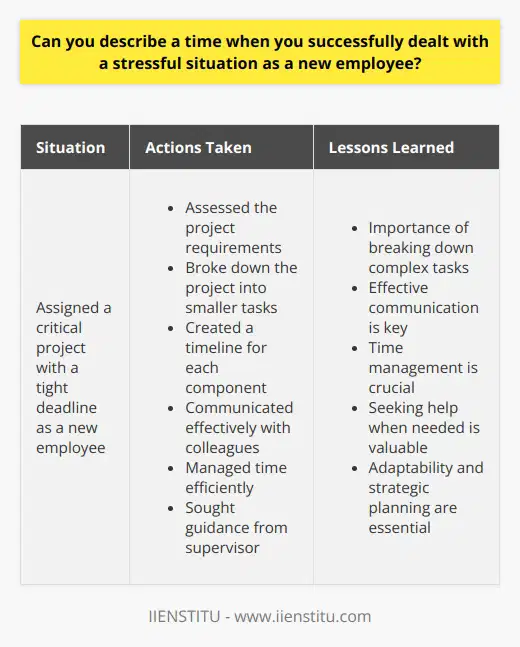
As someone who has navigated the ups and downs of professional life for over a decade, I can confidently say that managing stress peaks is an essential skill for success and well-being in any career. When I think back to my early days as a fresh-faced college graduate, eager to make my mark in the world, I realize how little I truly understood about the challenges that lay ahead. It was a time of excitement and possibility, but also one of naivety about the realities of the modern workplace.
I remember my first job out of college, a role I had fought tooth and nail to secure. I was determined to prove myself, to show that I had what it took to thrive in a fast-paced, high-pressure environment. But as the weeks turned into months, I found myself increasingly overwhelmed by the demands of the job. Tight deadlines, complex projects, and unexpected obstacles became the norm, and I struggled to keep my head above water.
It was during this time that I had my first real encounter with stress peaks. There were days when I felt like I was drowning in a sea of tasks and responsibilities, unsure of how I would ever manage to stay afloat. I remember one particularly challenging project, where everything that could go wrong, did go wrong. Suppliers let us down, communication broke down, and the deadline loomed ever closer. The pressure was immense, and I could feel my stress levels rising with each passing day.
Interview Question: Collaborating with Departments to Optimize Supply Chain
Interview Question: How Does Your Time Management Change When Stressed?
Looking back, I realize that this experience was a turning point for me. It forced me to confront the reality of stress in the workplace and to start thinking seriously about how I could develop strategies to cope with it. I began to research stress management techniques, reading books and articles on the subject, and seeking advice from more experienced colleagues.
Most Searched Prioritize Multiple Shipments İnterview Question
İmpact Of Remote Work On Time Management Strategies İn Job İnterviews
How Time Management Affects Personal Growth İnterview Question
One of the key insights I gained during this time was the importance of proactive stress management. Rather than simply reacting to stress when it arose, I learned that it was crucial to take steps to prevent it from reaching unmanageable levels in the first place. This meant prioritizing self-care, such as getting enough sleep, eating well, and exercising regularly. It also meant learning to set boundaries and to say no when necessary, rather than taking on more than I could realistically handle.
Proactive Stress Management:
One possible answer could focus on the candidate's approach to proactively managing stress before it escalates. They may mention techniques such as practicing mindfulness or meditation, engaging in regular exercise or hobbies, and maintaining a healthy work-life balance. By highlighting these proactive measures, the candidate demonstrates their understanding of the importance of self-care and stress prevention.Time and Task Management:
Effective time and task management play a crucial role in managing stress peaks. A candidate can discuss their experience in using tools and techniques such as prioritization, creating to-do lists, and setting realistic deadlines. They may also talk about their ability to break down complex tasks into manageable steps, thereby reducing the overall stress load.Delegation and Collaboration:
During stress peaks, it is essential to delegate tasks and collaborate with team members effectively. A candidate can explain how they assess team members' strengths and weaknesses, identify suitable tasks for delegation, and foster a culture of collaboration. By demonstrating their ability to distribute workload and seek support from their team, the candidate portrays themselves as a proactive and collaborative leader.Effective Communication:
Maintaining open and transparent communication is crucial during stress peaks. The candidate can describe how they ensure everyone is aware of the situation, set clear expectations, and provide regular updates. Effective communication helps to mitigate misunderstandings and fosters a sense of unity within the team, reducing stress levels for all involved.
Another important strategy I discovered was the power of effective time and task management. By breaking down large, complex projects into smaller, more manageable chunks, and by using tools like to-do lists and priority matrices, I found that I was able to stay on top of my workload and avoid becoming overwhelmed. I also learned the value of setting realistic deadlines for myself and communicating these clearly to my team and stakeholders.
Of course, even with the best-laid plans, stress peaks are sometimes unavoidable. In these moments, I found that delegation and collaboration were key. Rather than trying to shoulder the burden alone, I learned to identify the strengths of my team members and to delegate tasks accordingly. By fostering a culture of collaboration and open communication, we were able to weather even the toughest storms together.
One particularly memorable example of this came during a high-stakes project with an impossibly tight deadline. We were working around the clock to deliver, but it seemed like every time we made progress, a new obstacle appeared. Tensions were running high, and I could see the strain on my team's faces. That's when I realized that we needed to come together and approach the problem collaboratively.
How do you handle moments of heightened stress?
In dealing with stress peaks, what approach do you take?
Could you share your tactics for managing periods of excessive stress?
What methods do you employ when faced with stressful spikes?
When faced with intense stress, what strategies do you implement?
What measures do you take to navigate through stressful peaks?
What techniques do you find most effective when encountering high-stress situations?
How do you mitigate the impact of stress peaks through your approach?
In times of stress, what do you do to manage and overcome the intensity?
When stress levels rise significantly, what is your course of action to handle such situations?
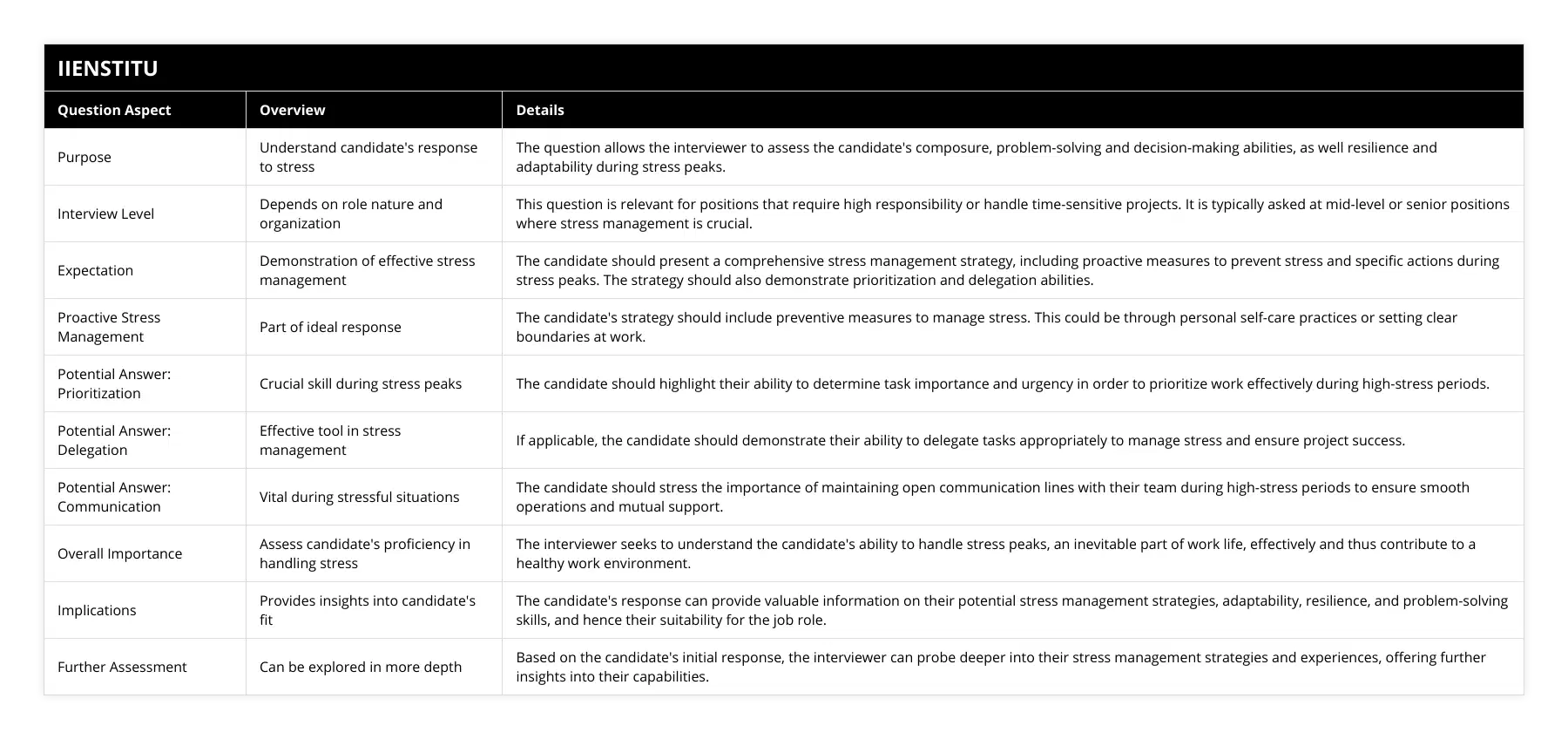
I called a team meeting and laid everything out on the table. We brainstormed solutions, identified areas where we could streamline our processes, and reassigned tasks to play to each team member's strengths. It wasn't easy, but by working together and maintaining open, honest communication, we were able to deliver the project on time and to a high standard. The sense of relief and camaraderie we felt at the end of that project was incredible, and it taught me the true value of teamwork in managing stress.
Another critical aspect of stress management that I've come to appreciate over the years is the importance of effective communication. When stress levels are high, it's all too easy for misunderstandings and miscommunications to occur. This can lead to added pressure and frustration for everyone involved. By making a concerted effort to keep lines of communication open, to provide regular updates and check-ins, and to ensure that everyone is on the same page, much of this unnecessary stress can be mitigated.
This principle was really brought home to me during a particularly challenging period in a previous role. I was leading a team through a major organizational restructure, and the uncertainty and change were taking a toll on everyone's stress levels. I realized that the key to navigating this difficult time was to prioritize transparency and open dialogue. I made sure to check in with each team member regularly, to listen to their concerns and to provide as much clarity and reassurance as I could. By keeping the lines of communication open, we were able to weather the storm together and emerge stronger on the other side.
Beyond these practical strategies, I've also found that cultivating a certain mindset is crucial for managing stress peaks. This means learning to reframe challenges as opportunities for growth and development, rather than as threats or obstacles. It means practicing self-compassion and forgiveness when things don't go perfectly, rather than falling into the trap of self-blame or negativity. And it means maintaining a healthy perspective and remembering that, no matter how stressful things might feel in the moment, this too shall pass.
One book that really helped me develop this mindset was "The Stress-Proof Brain" by Melanie Greenberg[^1]. Greenberg, a clinical psychologist, offers practical strategies for retraining your brain to handle stress more effectively. She emphasizes the importance of challenging negative self-talk, practicing mindfulness and relaxation techniques, and cultivating a growth mindset. By incorporating these strategies into my own life, I've found that I'm better able to maintain perspective and resilience in the face of stress peaks.
Of course, as valuable as all these strategies are, it's important to remember that stress management is not a one-size-fits-all proposition. What works for one person may not work for another, and it's crucial to find the techniques and approaches that resonate with you personally. This is something I really came to appreciate after reading "The Upside of Stress" by Kelly McGonigal[^2]. McGonigal, a health psychologist, argues that stress is not inherently bad, and that by changing our mindset around stress, we can actually harness its energy to fuel positive change and growth. This idea really resonated with me, and it's something I try to keep in mind when facing stress peaks in my own life.
Ultimately, managing stress peaks is an ongoing process, one that requires continuous learning, adaptation, and growth. It's not about eliminating stress altogether - after all, a certain amount of stress can actually be motivating and productive. Rather, it's about developing the tools and strategies to navigate stress effectively, to maintain our well-being and performance even in the face of intense pressure.
This is a skill that is particularly valuable in today's fast-paced, ever-changing work environment. As the world becomes more complex and interconnected, the ability to handle stress and uncertainty is increasingly vital for success. This is something that HR managers and interviewers are keenly aware of, which is why questions about stress management strategies are becoming more and more common in job interviews.
When faced with such questions, it's important to be honest and authentic in your response. Don't try to pretend that you never experience stress or that you have it all figured out. Instead, focus on sharing specific examples of times when you've successfully navigated stress peaks in the past. Use the STAR method (Situation, Task, Action, Result) to structure your answer, providing concrete details about the challenge you faced, the actions you took to address it, and the outcomes you achieved.
It's also important to emphasize that stress management is an ongoing process for you, one that you're constantly working to refine and improve. Talk about the proactive steps you take to manage stress, such as regular exercise, mindfulness practice, or time management techniques. Mention any relevant books, articles, or resources that have helped you develop your skills in this area. And don't be afraid to acknowledge that there's always more to learn - this shows that you're proactive, growth-oriented, and committed to continuous improvement.
Ultimately, the key to navigating stress peaks - both in job interviews and in life - is to approach the challenge with honesty, self-awareness, and a willingness to learn and adapt. By developing a toolkit of practical strategies, cultivating a resilient mindset, and being proactive about managing your well-being, you can not only survive stress peaks but actually thrive in the face of them.
And remember, you're not alone in this journey. Everyone experiences stress, and everyone has the capacity to learn and grow in their ability to manage it. By sharing our experiences and strategies with each other, by supporting and learning from one another, we can all become more resilient, adaptable, and successful in the face of life's challenges.
In the words of Stanford psychologist Kelly McGonigal, "Stress isn't always harmful. Once you appreciate that going through stress makes you better at it, it can be easier to face each new challenge."[^3] So the next time you find yourself in the midst of a stress peak, remember that this is an opportunity for growth, for learning, for becoming the best version of yourself. Embrace the challenge, trust in your ability to handle it, and know that on the other side lies greater strength, wisdom, and resilience.
References:
[^1]: Greenberg, M. (2017). The Stress-Proof Brain: Master Your Emotional Response to Stress Using Mindfulness and Neuroplasticity. New Harbinger Publications.
[^2]: McGonigal, K. (2016). The Upside of Stress: Why Stress Is Good for You, and How to Get Good at It. Avery.
[^3]: McGonigal, K. (2013). How to Make Stress Your Friend. TED Global 2013. Retrieved from https://www.ted.com/talks/kellymcgonigalhowtomakestressyour_friend
Frequently Asked Questions
How do you typically cope with stressful situations at work?
Coping with stressful situations at work is crucial for maintaining mental well-being and productivity. Several strategies can be employed to manage stress effectively in the workplace.
Identifying Stressors
The first step in coping with stress is to identify the sources of stress. This may include heavy workloads, tight deadlines, or interpersonal conflicts. Once the stressors are identified, it becomes easier to develop targeted coping strategies.
Time Management
Effective time management is a key strategy for reducing stress at work. This involves prioritizing tasks, setting realistic goals, and breaking large projects into smaller, manageable steps. By managing time efficiently, individuals can reduce the feeling of being overwhelmed and minimize stress.
Delegation and Seeking Support
Delegating tasks to colleagues or seeking support from supervisors can alleviate stress. Collaborating with team members and sharing responsibilities can lighten the workload and provide a sense of shared accomplishment.
Mindfulness and Relaxation Techniques
Practicing mindfulness and relaxation techniques can help manage stress in the moment. Deep breathing exercises, meditation, or taking short breaks can promote calmness and clarity of mind. These techniques can be easily incorporated into the workday to reduce stress levels.
Maintaining Work-Life Balance
Establishing clear boundaries between work and personal life is essential for managing stress. This includes setting aside time for hobbies, exercise, and social activities outside of work. Maintaining a healthy work-life balance helps recharge and prevents burnout.
Positive Attitude and Reframing
Adopting a positive attitude and reframing stressful situations can significantly impact stress levels. Focusing on the opportunities for growth and learning, rather than dwelling on the challenges, can shift perspective and reduce stress.
Seeking Professional Support
In cases of chronic or severe stress, seeking professional support from a therapist or counselor can be beneficial. They can provide additional coping strategies and help address underlying issues contributing to workplace stress.
By implementing these coping strategies, individuals can effectively manage stress at work, leading to improved well-being and enhanced job performance.
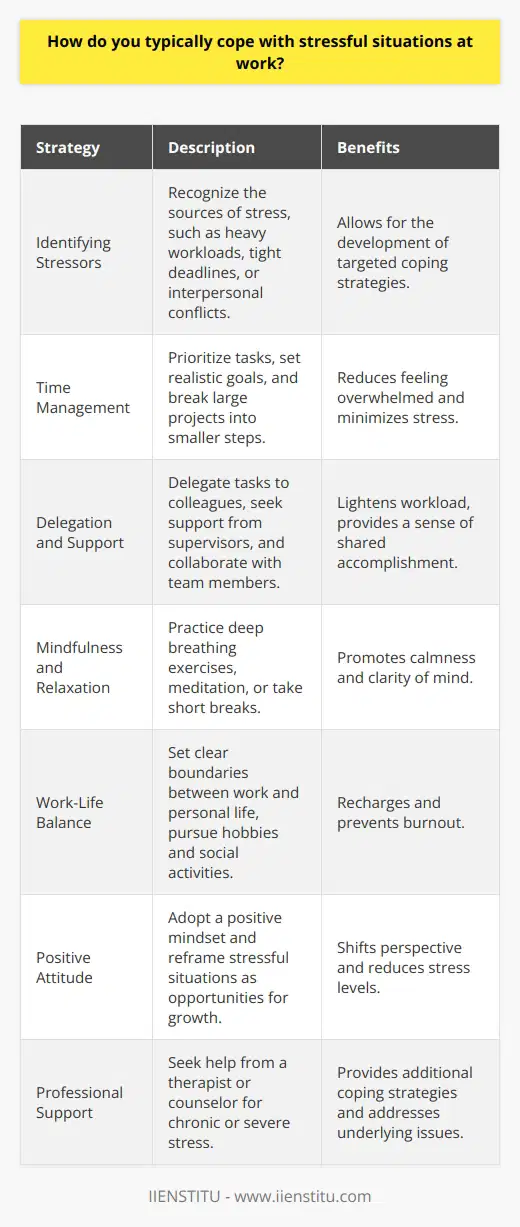
What strategies do you employ to manage pressure and maintain productivity?
Effective strategies for managing pressure and maintaining productivity are crucial for success in both personal and professional life. One key approach is to prioritize tasks based on their importance and urgency, allowing for better time management and reduced stress. Breaking down larger projects into smaller, manageable steps can also help alleviate pressure and improve focus. Additionally, setting realistic goals and deadlines is essential to avoid overcommitting and feeling overwhelmed.
The Power of Prioritization
Prioritizing tasks is a fundamental strategy for managing pressure and maintaining productivity. By identifying the most critical and time-sensitive tasks, individuals can allocate their time and energy more effectively. This approach helps to minimize stress and ensures that important deadlines are met, leading to a sense of accomplishment and control over one's workload.
Breaking Down Projects
Another effective strategy is to break down larger projects into smaller, more manageable steps. This approach makes the overall task less daunting and allows for better progress tracking. By focusing on one step at a time, individuals can maintain momentum and avoid feeling overwhelmed by the magnitude of the project. Celebrating small victories along the way can also boost motivation and productivity.
Setting Realistic Goals and Deadlines
Setting realistic goals and deadlines is crucial for managing pressure and maintaining productivity. Overcommitting or setting unrealistic expectations can lead to increased stress and decreased performance. By carefully considering available resources, time constraints, and personal capabilities, individuals can establish achievable targets. This approach helps to prevent burnout and fosters a sense of accomplishment as goals are met.
The Importance of Self-Care
In addition to task-oriented strategies, prioritizing self-care is essential for managing pressure and maintaining productivity. Engaging in regular exercise, practicing relaxation techniques, and ensuring sufficient sleep can help reduce stress and improve overall well-being. Taking short breaks throughout the day can also help refresh the mind and boost concentration, ultimately leading to increased productivity.
Seeking Support
Finally, seeking support from colleagues, friends, or family members can be invaluable in managing pressure and maintaining productivity. Sharing concerns and challenges with others can provide fresh perspectives and help alleviate stress. Building a strong support network can also foster a sense of connection and encouragement, making it easier to navigate difficult periods and maintain focus on goals.
By employing a combination of these strategies, individuals can effectively manage pressure and maintain productivity in various aspects of their lives. Prioritizing tasks, breaking down projects, setting realistic goals, practicing self-care, and seeking support are all essential components of a comprehensive approach to success.
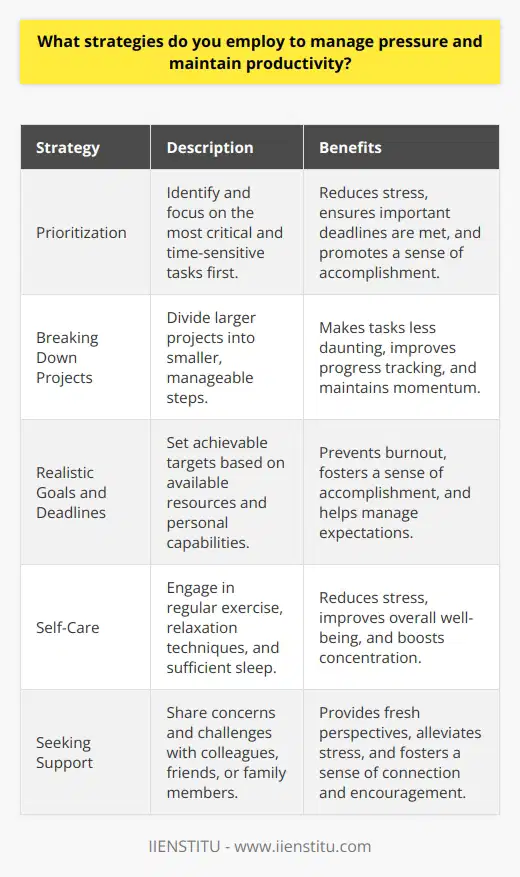
Can you describe a time when you successfully handled a high-pressure situation and delivered results?
Handling high-pressure situations and delivering results is a crucial skill in both personal and professional life. One such instance where I successfully navigated a challenging situation was during my final year of university. As the lead organizer of a major academic conference, I faced numerous obstacles that threatened the event's success.
Challenges Faced
The first hurdle was securing funding for the conference. Our initial sponsor backed out at the last minute, leaving us with a significant financial gap. Additionally, we encountered logistical issues with the venue, as the original location became unavailable due to unforeseen circumstances. These setbacks put immense pressure on the organizing team, as the conference date was fast approaching.
Adaptability and Problem-Solving
To overcome these challenges, I quickly adapted and sought alternative solutions. I reached out to various organizations and individuals who could potentially provide financial support. Through persistent networking and persuasive communication, I managed to secure new sponsors who believed in the conference's value. This alleviated the financial strain and allowed us to proceed with the event planning.
Simultaneously, I worked closely with my team to find a suitable replacement venue. We explored multiple options, considering factors such as capacity, accessibility, and technical requirements. After extensive research and negotiations, we secured a new location that met our needs and exceeded our expectations.
Effective Communication and Delegation
Throughout the high-pressure situation, effective communication played a vital role in keeping the team motivated and focused. I regularly updated team members on progress, sought their input, and provided clear instructions. By delegating tasks based on individual strengths, I ensured that everyone contributed effectively towards our common goal.
I also maintained open lines of communication with conference participants, speakers, and stakeholders. Keeping them informed about the changes in venue and other relevant details helped maintain their confidence in the event's success.
Successful Outcome
Despite the initial setbacks, the conference turned out to be a resounding success. The new venue provided an excellent setting for engaging discussions and networking opportunities. Attendees praised the smooth organization and the quality of the presentations. The conference attracted a diverse range of participants, including renowned scholars and industry professionals.
The success of the event not only showcased my ability to handle high-pressure situations but also demonstrated my leadership skills. I learned the importance of adaptability, effective communication, and problem-solving when faced with unexpected challenges. This experience strengthened my confidence in tackling complex situations and delivering results under pressure.
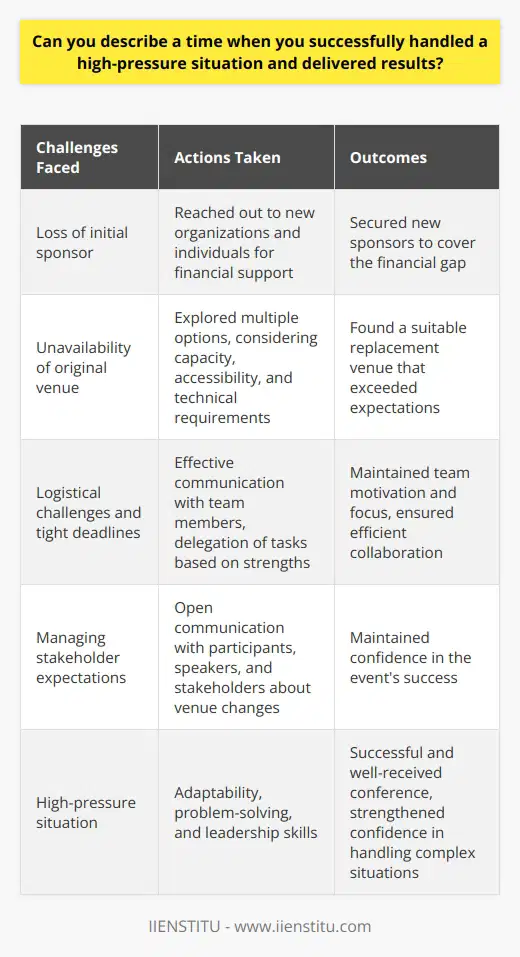
What is your strategy for managing stress during peak periods?
Effectively managing stress during peak periods is crucial for maintaining productivity, well-being, and overall success. Developing a comprehensive strategy to cope with high-pressure situations can help individuals navigate challenging times with greater ease and resilience. This essay explores various techniques and approaches to managing stress during demanding periods, focusing on the importance of self-care, prioritization, and maintaining a balanced perspective.
Prioritizing Self-Care
One of the most important aspects of managing stress during peak periods is prioritizing self-care. Engaging in activities that promote physical, mental, and emotional well-being can help individuals build resilience and better cope with stress. Regular exercise, such as walking, jogging, or yoga, can help reduce stress levels and improve overall mood. Additionally, practicing mindfulness techniques, such as meditation or deep breathing exercises, can help calm the mind and promote relaxation.
Maintaining a Balanced Diet
Eating a balanced diet rich in fruits, vegetables, and whole grains can also contribute to better stress management. Avoiding excessive caffeine and sugar intake can help prevent energy crashes and mood swings. Staying hydrated by drinking plenty of water throughout the day is also essential for maintaining physical and mental well-being.
Getting Sufficient Sleep
Ensuring adequate sleep is another crucial aspect of self-care during peak periods. Aim for 7-9 hours of sleep per night to allow the body and mind to recharge. Establishing a consistent sleep schedule and creating a relaxing bedtime routine can help improve sleep quality and duration.
Prioritizing Tasks and Setting Realistic Goals
Effective stress management during peak periods also involves prioritizing tasks and setting realistic goals. Break down larger projects into smaller, manageable tasks to avoid feeling overwhelmed. Use time management techniques, such as the Pomodoro Technique, to maintain focus and avoid burnout. Regularly assess progress and adjust goals as needed to ensure they remain achievable.
Delegating and Seeking Support
Don't hesitate to delegate tasks or seek support from colleagues, friends, or family members when necessary. Collaborating with others can help distribute the workload and alleviate stress. Open communication and asking for help when needed can foster a supportive environment and prevent feelings of isolation.
Maintaining a Balanced Perspective
During peak periods, it's easy to get caught up in the pressure and lose sight of the bigger picture. Maintain a balanced perspective by regularly reminding yourself of your achievements and progress. Celebrate small victories and acknowledge your efforts, even if the desired outcome hasn't been reached yet. Practice self-compassion and avoid self-criticism, recognizing that setbacks and challenges are a normal part of the process.
Engaging in Hobbies and Relaxation Techniques
Making time for hobbies and relaxation techniques can provide a much-needed break from stress. Engage in activities you enjoy, such as reading, painting, or listening to music. Practice relaxation techniques, such as progressive muscle relaxation or guided imagery, to promote a sense of calm and well-being.
In conclusion, managing stress during peak periods requires a multi-faceted approach that prioritizes self-care, task management, and maintaining a balanced perspective. By implementing these strategies and techniques, individuals can build resilience, improve their ability to cope with high-pressure situations, and ultimately achieve their goals with greater ease and success.
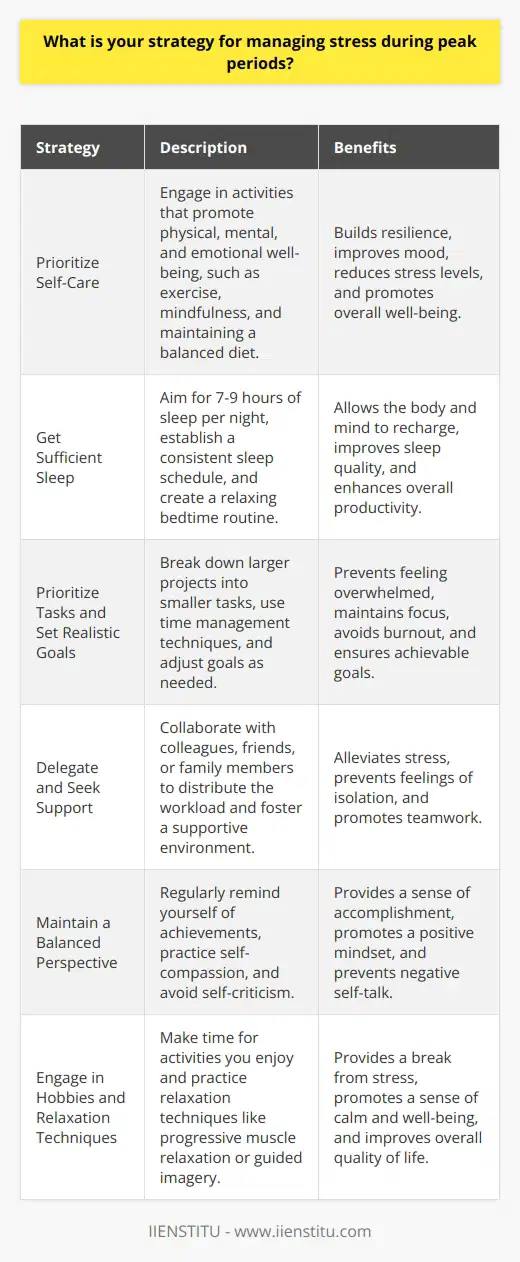
How do you prioritize tasks and maintain focus when experiencing high levels of stress?
Prioritizing tasks and maintaining focus during high-stress periods is crucial for productivity and well-being. One effective strategy is to create a prioritized to-do list, ranking tasks based on urgency and importance. This helps to identify critical tasks that require immediate attention, allowing for better time management and reduced stress levels. Breaking larger tasks into smaller, manageable steps can also make the workload feel less overwhelming and more achievable.
Techniques for Maintaining Focus
To maintain focus, it is essential to minimize distractions and create a conducive work environment. This may involve finding a quiet space, turning off notifications on devices, and setting boundaries with colleagues or family members. Incorporating regular breaks into the workday can also help to recharge and refocus the mind, ultimately increasing productivity and reducing stress.
The Pomodoro Technique
The Pomodoro Technique is a popular time management method that can help maintain focus. This technique involves working in 25-minute intervals, followed by short breaks. After completing four intervals, a longer break is taken. This approach can help to break down tasks into manageable chunks, maintain motivation, and reduce the risk of burnout.
Mindfulness and Stress Reduction
Practicing mindfulness and stress-reduction techniques can also be beneficial when experiencing high levels of stress. Deep breathing exercises, meditation, or yoga can help to calm the mind, reduce anxiety, and improve overall focus. Incorporating these practices into daily routines can help to build resilience and better manage stress in the long term.
Delegating and Seeking Support
When faced with a heavy workload and high stress levels, it is important to recognize when to delegate tasks or seek support. Collaborating with colleagues, assigning tasks to team members, or outsourcing certain responsibilities can help to alleviate pressure and ensure that critical tasks are completed efficiently.
Communicating with Supervisors
Open communication with supervisors or managers is also crucial during high-stress periods. Discussing workload concerns, seeking guidance, or requesting additional resources can help to manage expectations and find solutions to reduce stress levels.
Maintaining a Healthy Work-Life Balance
Finally, maintaining a healthy work-life balance is essential for managing stress and ensuring long-term productivity. Setting clear boundaries between work and personal life, engaging in hobbies or activities that promote relaxation, and prioritizing self-care can help to reduce stress and improve overall well-being.
The Importance of Sleep and Exercise
Adequate sleep and regular exercise are also critical components of stress management. Prioritizing a consistent sleep schedule and incorporating physical activity into daily routines can help to reduce stress, improve focus, and enhance overall mental and physical health.
By implementing these strategies and techniques, individuals can effectively prioritize tasks, maintain focus, and manage stress levels during challenging times. Developing strong time management skills, practicing self-care, and seeking support when needed can lead to increased productivity, improved well-being, and long-term success in both personal and professional life.
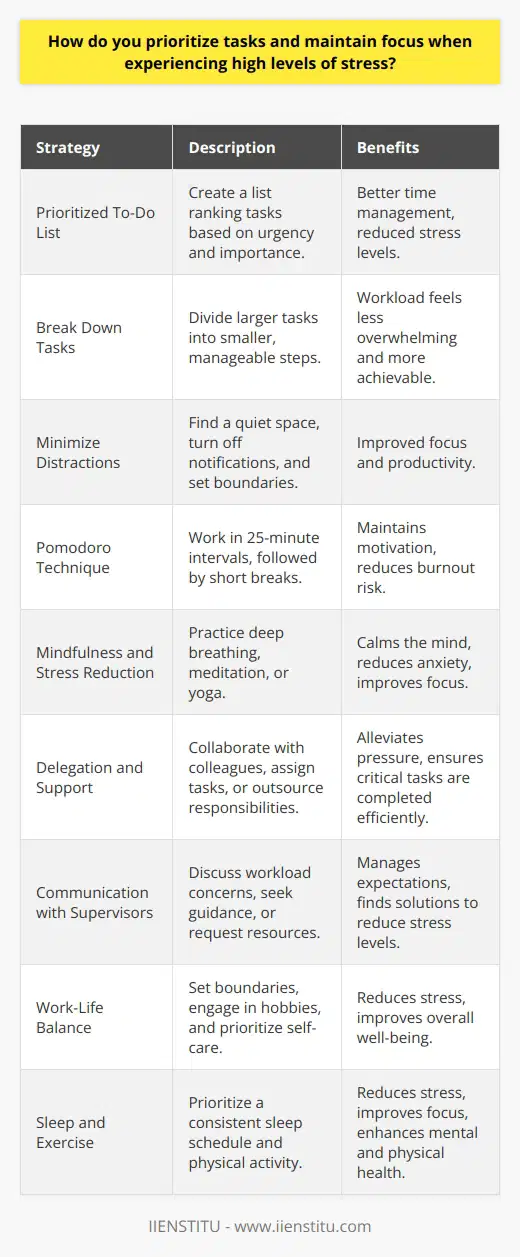
In what ways do you practice self-care to prevent burnout during times of intense pressure?
Practicing self-care is crucial for preventing burnout during times of intense pressure. One effective way to do this is by setting boundaries and learning to say no to non-essential tasks or commitments. This allows you to prioritize your well-being and focus on what truly matters. Additionally, engaging in regular physical exercise, such as yoga or jogging, can help reduce stress and improve overall mental health.
The Importance of Mindfulness and Relaxation
Incorporating mindfulness and relaxation techniques into your daily routine can also be beneficial. Mindfulness involves being present in the moment and observing your thoughts and feelings without judgment. This can be achieved through meditation, deep breathing exercises, or simply taking a few minutes each day to sit quietly and focus on your breath. Relaxation techniques, such as progressive muscle relaxation or guided imagery, can help reduce tension and promote a sense of calm.
Nurturing Social Connections and Support Systems
Maintaining strong social connections and support systems is another important aspect of self-care. Surrounding yourself with positive, supportive people can provide a sense of belonging and help you cope with stress. Make time to connect with friends and family, either in person or through virtual means. Sharing your feelings and concerns with trusted individuals can also help alleviate the burden of stress and prevent feelings of isolation.
Engaging in Hobbies and Creative Pursuits
Engaging in hobbies and creative pursuits can be a powerful form of self-care. Participating in activities you enjoy, such as painting, gardening, or playing a musical instrument, can provide a sense of accomplishment and help you unwind. These activities can also serve as a form of self-expression and allow you to tap into your creative side, providing a much-needed break from the pressures of daily life.
Prioritizing Self-Reflection and Personal Growth
Finally, prioritizing self-reflection and personal growth can help prevent burnout and promote resilience. Take time to reflect on your experiences, both positive and negative, and consider what you can learn from them. Set personal goals and work towards them, celebrating your achievements along the way. Engage in activities that promote personal growth, such as reading self-help books, attending workshops, or seeking guidance from a mentor or therapist.
By incorporating these self-care practices into your daily life, you can build resilience and prevent burnout during times of intense pressure. Remember, taking care of yourself is not a luxury, but a necessity for maintaining your physical, mental, and emotional well-being.
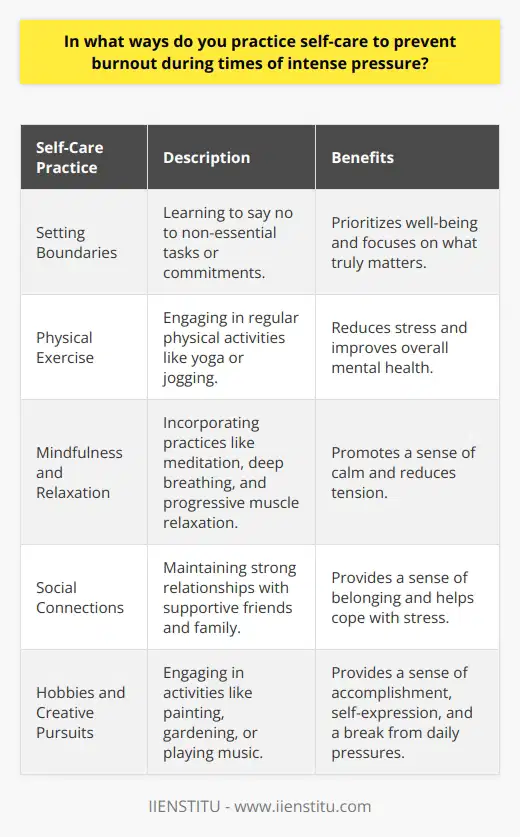
How do you typically handle stress and pressure in a work environment?
Stress and pressure are common challenges in any work environment, and effectively managing them is crucial for maintaining productivity and well-being. One effective strategy for handling stress is to prioritize tasks and create a clear plan of action. By breaking down larger projects into smaller, manageable steps, individuals can reduce feelings of overwhelm and maintain a sense of control over their workload.
Time Management Techniques
Employing time management techniques, such as the Pomodoro Technique or time blocking, can also help alleviate stress. These methods involve dedicating specific time intervals to focused work, followed by short breaks to recharge. By structuring the workday in this manner, individuals can maintain a steady pace and avoid burnout.
Communication and Delegation
Open communication with colleagues and supervisors is another key aspect of managing stress in the workplace. When faced with a challenging situation or an overwhelming workload, it is essential to communicate concerns and seek support when needed. Delegating tasks to team members or collaborating on projects can help distribute the workload and reduce individual stress levels.
Self-Care Practices
Incorporating self-care practices into daily routines can also contribute to better stress management. Taking regular breaks throughout the day to stretch, practice deep breathing exercises, or engage in brief meditation sessions can help reduce tension and improve focus. Maintaining a healthy work-life balance by setting boundaries and making time for personal interests and hobbies outside of work is also crucial for overall well-being.
Positive Mindset and Reframing
Cultivating a positive mindset and reframing stressful situations can help individuals approach challenges with greater resilience. Instead of viewing stress as an insurmountable obstacle, it can be helpful to see it as an opportunity for growth and learning. By focusing on the potential benefits of overcoming a challenging situation, individuals can maintain motivation and a sense of purpose.
Ultimately, effectively handling stress and pressure in the workplace requires a combination of practical strategies and a proactive mindset. By prioritizing tasks, employing time management techniques, communicating openly, engaging in self-care practices, and maintaining a positive outlook, individuals can navigate the demands of their work environment with greater ease and resilience.
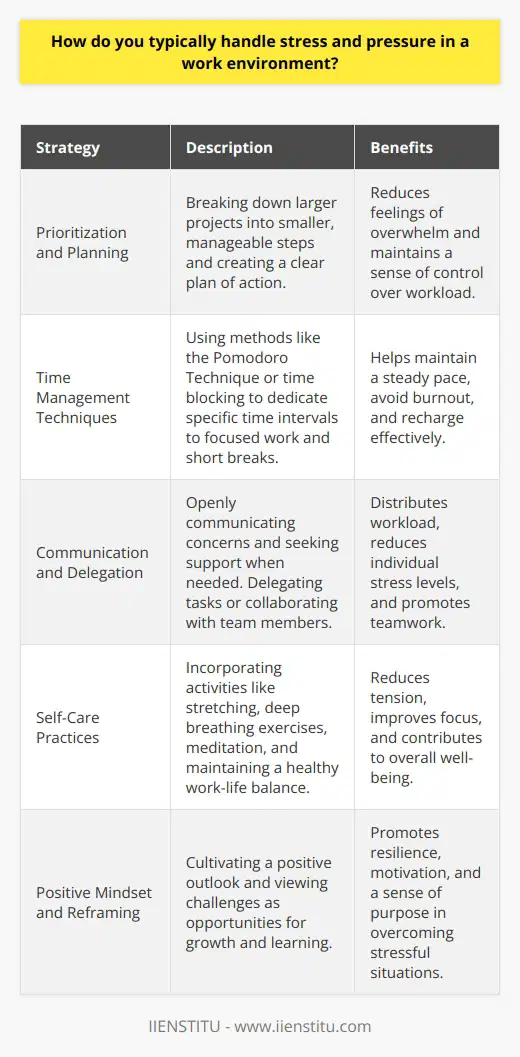
What strategies do you employ to manage stress and maintain productivity when faced with tight deadlines or challenging situations?
Effective stress management and maintaining productivity under pressure require a combination of strategies and techniques. One crucial approach is prioritizing tasks based on their urgency and importance, allowing for better time management and reduced stress levels. Breaking down larger projects into smaller, manageable steps can also help prevent overwhelming feelings and improve focus.
Mindfulness and Relaxation Techniques
Practicing mindfulness, such as deep breathing exercises or meditation, can significantly reduce stress and improve mental clarity. Taking short breaks throughout the day to engage in relaxation techniques or physical activity can help refresh the mind and boost productivity. Additionally, maintaining a healthy work-life balance by setting boundaries and allocating time for self-care activities is essential for overall well-being and stress management.
Communication and Support
Open communication with team members, supervisors, or clients is crucial when facing challenging situations or tight deadlines. Discussing concerns, seeking guidance, and collaborating with others can help alleviate stress and find practical solutions. Building a support network of colleagues, friends, or family members can provide encouragement and help maintain a positive outlook during difficult times.
Time Management Techniques
Implementing effective time management techniques, such as the Pomodoro Technique or time-blocking, can help maintain focus and productivity. These methods involve dedicating specific time intervals to focused work, followed by short breaks to recharge. Using tools like calendars, to-do lists, or project management software can also help organize tasks and track progress, reducing stress and increasing efficiency.
Adapting and Learning
Embracing a growth mindset and viewing challenges as opportunities for learning and development can help reduce stress and maintain motivation. Reflecting on past experiences and identifying successful strategies can provide valuable insights for handling similar situations in the future. Continuously seeking feedback, both positive and constructive, can help improve performance and build resilience in the face of adversity.
Self-Care and Healthy Habits
Prioritizing self-care is essential for managing stress and maintaining productivity. Engaging in regular physical exercise, maintaining a balanced diet, and getting sufficient sleep can significantly impact both physical and mental well-being. Taking time to pursue hobbies or engage in activities that bring joy and relaxation can also help reduce stress and improve overall mood.
By employing a combination of these strategies, individuals can effectively manage stress and maintain productivity, even when faced with tight deadlines or challenging situations. It is important to remember that everyone's stress management needs are unique, and it may take time to find the techniques that work best for each individual.
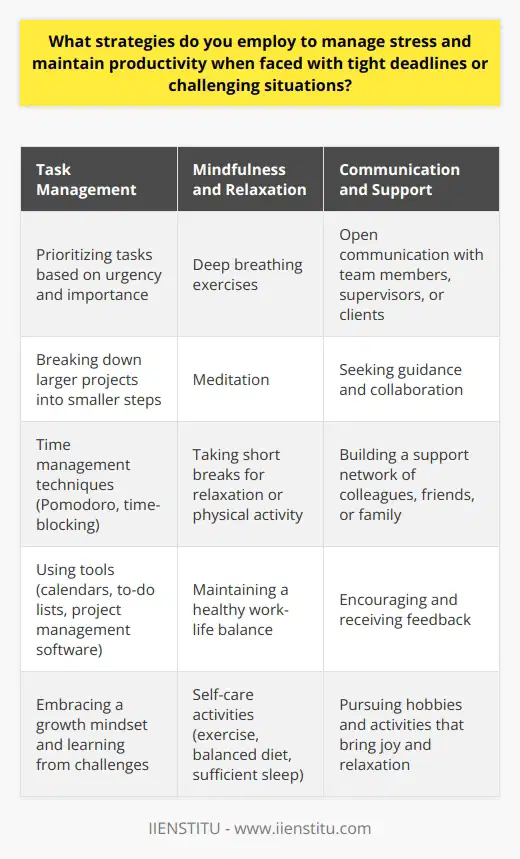
Can you describe a specific instance where you successfully navigated a high-pressure situation and what techniques you utilized to handle the stress?
Navigating high-pressure situations requires a combination of mental fortitude, effective stress management techniques, and adaptability. One specific instance where I successfully navigated a high-pressure situation was during my final year of university. I was juggling multiple deadlines for assignments, preparing for exams, and working part-time to support myself financially. The stress was immense, and I felt overwhelmed by the sheer volume of tasks I needed to complete within a limited timeframe.
Prioritizing and Time Management
To handle the stress, I first prioritized my tasks based on their urgency and importance. I created a detailed schedule, allocating specific time slots for each assignment, study session, and work shift. By breaking down my responsibilities into manageable chunks, I felt more in control of my situation. I also made sure to include breaks in my schedule to avoid burnout and maintain a sense of balance.
Mindfulness and Relaxation Techniques
To cope with the mounting pressure, I incorporated mindfulness and relaxation techniques into my daily routine. I practiced deep breathing exercises and meditation to calm my mind and reduce anxiety. These techniques helped me stay focused and grounded, even during the most stressful moments. I also made sure to engage in physical exercise regularly, as it provided a healthy outlet for stress and helped me maintain mental clarity.
Support System and Communication
Another crucial aspect of navigating this high-pressure situation was relying on my support system. I reached out to friends, family, and classmates for encouragement and assistance when needed. I communicated openly with my professors about my challenges and sought their guidance and support. By surrounding myself with a strong network of individuals who understood my situation, I felt less alone and more capable of overcoming the obstacles I faced.
Adaptability and Positive Mindset
Throughout this challenging period, I maintained a positive mindset and remained adaptable. I understood that setbacks and unexpected challenges were inevitable, but I chose to view them as opportunities for growth and learning. When faced with a particularly difficult task or setback, I reframed my perspective and focused on finding solutions rather than dwelling on the problem. This approach helped me stay resilient and motivated, even in the face of adversity.
Celebrating Small Victories
To maintain momentum and boost my morale, I celebrated small victories along the way. Whether it was completing a challenging assignment or achieving a personal milestone, I took the time to acknowledge my progress and hard work. These moments of self-recognition helped me stay motivated and reminded me of my capabilities, even when the pressure was high.
By implementing these techniques – prioritizing tasks, practicing mindfulness, seeking support, maintaining a positive mindset, and celebrating small victories – I successfully navigated the high-pressure situation during my final year of university. While it was a challenging experience, it taught me valuable lessons about stress management, resilience, and the importance of self-care. These techniques have since become an integral part of my approach to handling high-pressure situations in various aspects of my life.
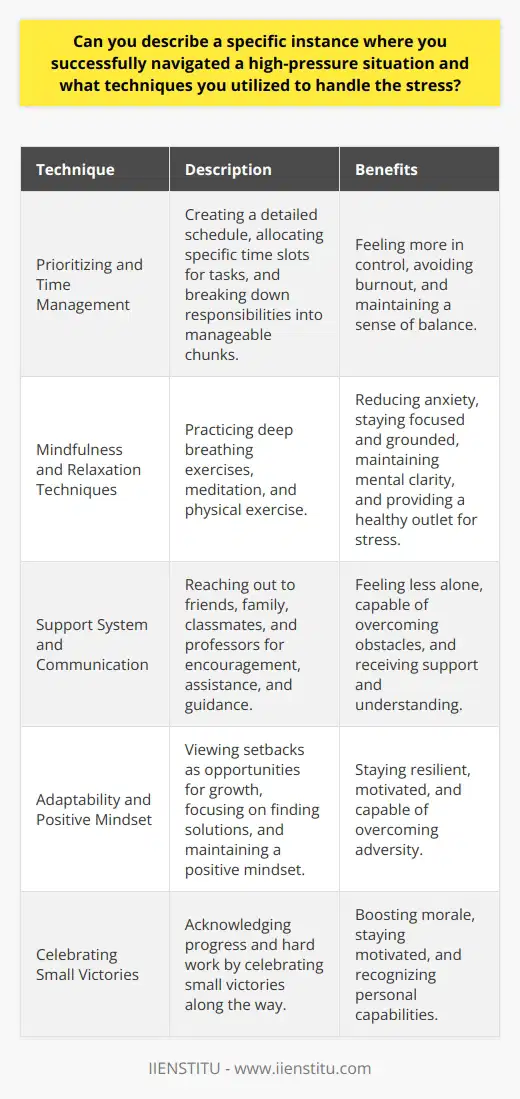
What strategies do you employ to manage stress during peak periods?
Stress management is a crucial skill to develop, especially during peak periods when demands are high. Employing effective strategies can help individuals maintain their well-being and productivity. This paragraph explores various techniques that can be used to manage stress during challenging times.
Prioritizing Tasks and Time Management
One of the most important strategies for managing stress is prioritizing tasks and managing time effectively. By identifying and focusing on the most critical tasks, individuals can reduce feelings of overwhelm. Breaking larger projects into smaller, manageable steps can also help make the workload feel more achievable. Using tools like calendars, to-do lists, and reminders can assist in staying organized and on track.
Practicing Mindfulness and Relaxation Techniques
Incorporating mindfulness and relaxation techniques into daily routines can be highly beneficial for stress management. Mindfulness involves being present in the moment and observing thoughts and emotions without judgment. Practices such as deep breathing, meditation, and yoga can promote relaxation and reduce stress levels. Taking short breaks throughout the day to engage in these activities can help maintain a sense of calm and balance.
Maintaining a Healthy Lifestyle
Adopting a healthy lifestyle is another key strategy for managing stress. Regular exercise, such as walking, jogging, or cycling, can help release endorphins and reduce stress. Eating a balanced diet rich in fruits, vegetables, and whole grains can provide the necessary nutrients to support both physical and mental health. Getting enough quality sleep is also essential for stress management, as it allows the body and mind to recharge and recover.
Seeking Support and Setting Boundaries
During peak periods, it's important to seek support from others and set boundaries when necessary. Communicating with colleagues, friends, or family members about challenges and seeking their assistance can help alleviate stress. Setting boundaries, such as saying no to non-essential tasks or delegating responsibilities, can prevent taking on more than one can handle. Seeking professional help, such as counseling or therapy, can also provide valuable support and guidance during particularly stressful times.
Engaging in Hobbies and Leisure Activities
Making time for hobbies and leisure activities is another effective strategy for managing stress. Engaging in activities that bring joy and relaxation, such as reading, painting, or listening to music, can provide a much-needed break from work-related stressors. Pursuing interests outside of work can also help maintain a sense of balance and perspective, reminding individuals that there is more to life than just their professional responsibilities.
By employing a combination of these strategies, individuals can effectively manage stress during peak periods. Prioritizing tasks, practicing mindfulness, maintaining a healthy lifestyle, seeking support, setting boundaries, and engaging in enjoyable activities can all contribute to reduced stress levels and improved overall well-being. It's important to remember that stress management is an ongoing process, and what works for one person may not work for another. Experimenting with different techniques and finding what resonates personally is key to developing a sustainable stress management plan.
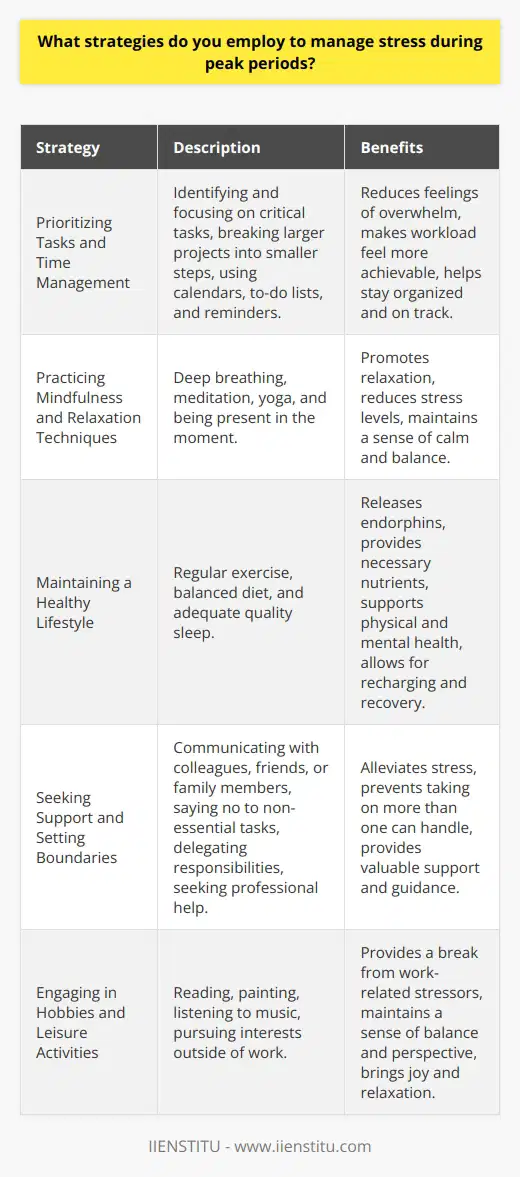
Can you provide examples of how you have successfully handled stress peaks in the past?
Stress is an inevitable part of life, and everyone experiences stress peaks at some point. Successfully handling these peaks is crucial for maintaining mental and physical well-being. Here are some examples of how I have effectively managed stress peaks in the past.
Prioritizing and Time Management
One of the most effective ways I have handled stress peaks is by prioritizing tasks and managing my time efficiently. When faced with multiple deadlines and competing demands, I take a step back and assess the importance and urgency of each task. I create a to-do list and allocate my time accordingly, focusing on the most critical tasks first. Breaking larger projects into smaller, manageable steps also helps me avoid feeling overwhelmed.
Effective Communication
Clear and open communication has been instrumental in managing stress peaks. When I am overwhelmed with work or facing a challenging situation, I reach out to my colleagues, supervisors, or team members for support and guidance. By expressing my concerns and seeking help when needed, I can distribute the workload and find solutions collaboratively. Effective communication also helps prevent misunderstandings and conflicts that can contribute to stress.
Self-Care and Stress-Reduction Techniques
Taking care of my physical and mental well-being is crucial during stress peaks. I make sure to prioritize self-care activities that help me relax and recharge. Regular exercise, such as going for a run or practicing yoga, helps me release tension and clear my mind. I also engage in hobbies and activities that bring me joy and provide a much-needed break from stressors. Mindfulness techniques, such as deep breathing and meditation, have been effective in reducing anxiety and promoting a sense of calm.
Seeking Support
During particularly challenging times, I have learned the importance of seeking support from others. I reach out to trusted friends, family members, or mentors to discuss my concerns and gain a fresh perspective. Talking through my stressors and receiving encouragement and advice helps me feel less alone and more equipped to handle the challenges I face. Additionally, I have sought professional support, such as counseling or therapy, when needed to develop healthy coping strategies and work through underlying issues contributing to stress.
Maintaining Work-Life Balance
Achieving a healthy work-life balance is essential for managing stress peaks. I set boundaries between my work and personal life, ensuring that I allocate sufficient time for relaxation, hobbies, and social connections. By prioritizing my well-being and engaging in activities that bring me joy outside of work, I can recharge and approach stressors with a clearer and more resilient mindset.
Adaptability and Flexibility
Stress peaks often arise from unexpected changes or challenges. I have learned to cultivate adaptability and flexibility in my approach to work and life. When faced with setbacks or obstacles, I try to maintain a positive attitude and focus on finding solutions rather than dwelling on the problems. Being open to adjusting my plans and strategies helps me navigate stress peaks more effectively and reduces the pressure I place on myself.
In conclusion, successfully handling stress peaks involves a combination of strategies, including prioritization, effective communication, self-care, seeking support, maintaining work-life balance, and cultivating adaptability. By implementing these techniques and developing resilience, I have been able to navigate stress peaks more effectively and maintain my overall well-being.
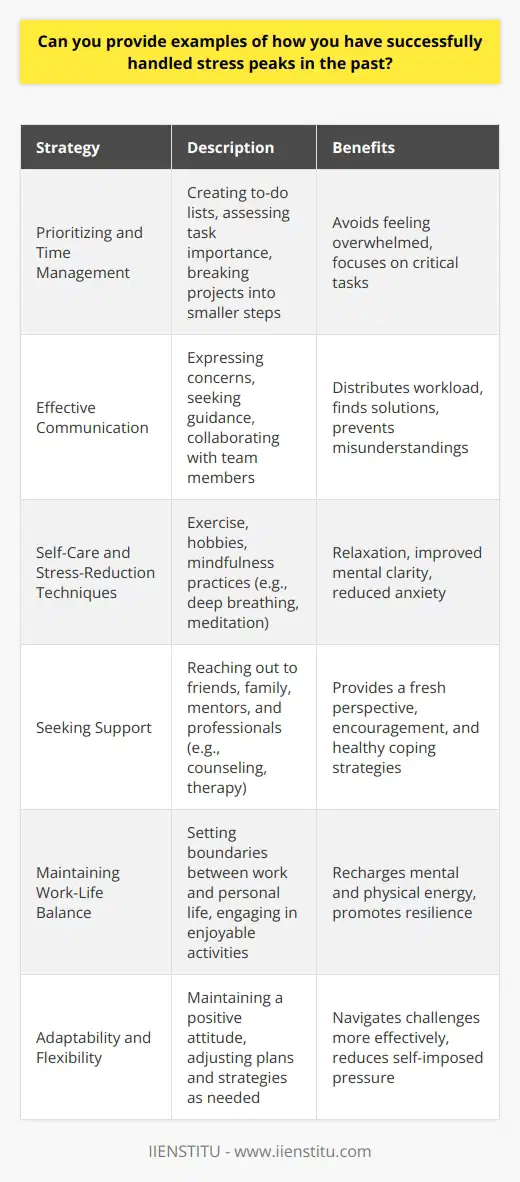
How do you prioritize tasks and maintain focus when faced with high-stress situations?
Prioritizing tasks and maintaining focus in high-stress situations require a systematic approach and mental discipline. The first step is to assess the urgency and importance of each task. Urgent tasks demand immediate attention, while important tasks contribute to long-term goals. By categorizing tasks using the Eisenhower Matrix, one can identify which tasks to tackle first. Once priorities are set, it's crucial to create a plan of action. Breaking down larger tasks into smaller, manageable steps helps maintain focus and prevents overwhelm.
Minimize Distractions
Distractions are a significant hindrance to maintaining focus, especially in high-stress situations. Identify and eliminate potential distractions, such as turning off notifications on devices or finding a quiet workspace. Implementing the Pomodoro Technique, which involves working in focused 25-minute intervals followed by short breaks, can help maintain concentration. During these intervals, give your full attention to the task at hand. If distracting thoughts arise, jot them down to address later, allowing you to quickly refocus on the current task.
Practice Mindfulness
Mindfulness is a powerful tool for maintaining focus and reducing stress. Take short breaks throughout the day to practice deep breathing exercises or meditation. These practices help clear the mind, reduce anxiety, and improve overall focus. Incorporating mindfulness into your daily routine can increase your ability to stay present and engaged, even in high-pressure situations.
Prioritize Self-Care
Taking care of your physical and mental well-being is essential for maintaining focus and managing stress. Ensure you get enough sleep, eat a balanced diet, and engage in regular exercise. These habits contribute to improved cognitive function and emotional resilience. Additionally, don't hesitate to reach out for support when needed. Collaborating with colleagues or seeking guidance from mentors can help you navigate challenging situations and maintain focus on your goals.
Regularly Review and Adjust
As circumstances change, it's essential to regularly review and adjust your priorities. Reflect on your progress, reassess the importance of tasks, and make necessary adjustments to your plan. Celebrate your accomplishments along the way, as this helps maintain motivation and focus. By remaining adaptable and proactive in your approach, you can effectively prioritize tasks and maintain focus, even in the face of high-stress situations.
Develop a Growth Mindset
Adopting a growth mindset is crucial for maintaining focus and navigating high-stress situations. Embrace challenges as opportunities for learning and development, rather than viewing them as threats. Reframe negative self-talk and cultivate a positive inner dialogue that encourages perseverance and resilience. By viewing setbacks as temporary and focusing on the lessons learned, you can maintain a sense of perspective and stay focused on your goals.
Conclusion
Prioritizing tasks and maintaining focus in high-stress situations require a combination of strategic planning, mental discipline, and self-care. By assessing the importance and urgency of tasks, minimizing distractions, practicing mindfulness, prioritizing self-care, regularly reviewing and adjusting, and developing a growth mindset, individuals can effectively navigate challenging circumstances and maintain focus on their goals. With practice and persistence, these strategies can become habitual, enabling one to thrive in even the most demanding situations.
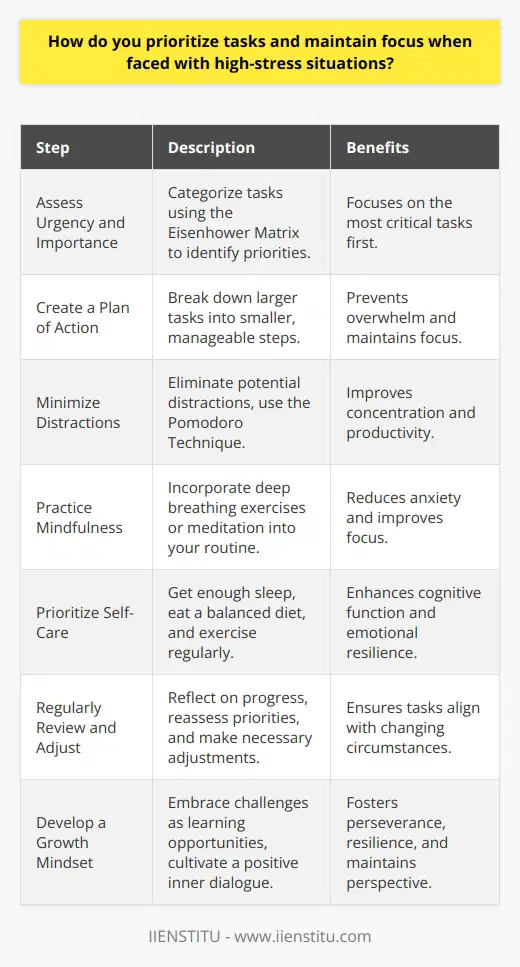
What are some common sample stress interview questions that employers ask?
Employers often use stress interview questions to assess a candidate's ability to handle pressure and think on their feet. These questions are designed to put the interviewee in an uncomfortable or challenging situation, testing their problem-solving skills and resilience. Some common sample stress interview questions include:
Handling Conflict
Employers may ask about a time when you faced a difficult colleague or customer and how you resolved the issue. They want to know if you can remain professional and find solutions under pressure.
Example question:
"Describe a situation where you had to deal with a challenging client or coworker. How did you handle it?"
Admitting Mistakes
Interviewers might inquire about a time when you made a mistake at work and how you addressed it. They seek to understand your ability to take responsibility and learn from your errors.
Example question:
"Tell me about a time when you made a mistake at work. What did you do to fix it?"
Adapting to Change
Companies often ask questions related to your adaptability and flexibility in the face of change. They want to know if you can adjust your approach when faced with new challenges or situations.
Example question:
"Describe a time when you had to adapt to a significant change at work. How did you manage it?"
Working Under Pressure
Employers may ask about your experience working under tight deadlines or in high-pressure situations. They want to assess your ability to prioritize tasks and maintain composure when the stakes are high.
Example question:
"Give an example of a time when you had to work under extreme pressure. How did you cope?"
Handling Failure
Interviewers might ask about a time when you failed at a task or project and how you bounced back. They want to know if you can learn from setbacks and maintain a positive attitude.
Example question:
"Describe a situation where you failed to meet a goal or objective. What did you learn from the experience?"
By asking these types of stress interview questions, employers can gain valuable insights into a candidate's problem-solving abilities, resilience, and capacity to perform under pressure. It is essential for job seekers to prepare for these questions by reflecting on their experiences and developing concise, honest responses that showcase their strengths and growth mindset.
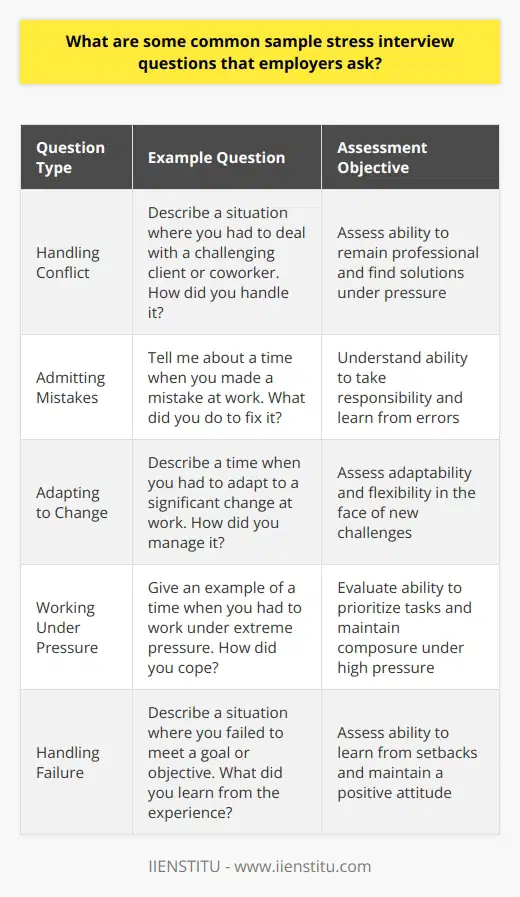
How can I effectively answer sample stress interview questions?
To effectively answer sample stress interview questions, it's essential to prepare beforehand and practice your responses. Start by researching common stress interview questions and familiarizing yourself with the types of questions you might encounter. Consider the skills and qualities the employer is likely seeking and think about how you can demonstrate these through your answers.
Understanding the Purpose of Stress Interview Questions
Stress interview questions are designed to assess how well you handle pressure and unexpected challenges. Employers want to see if you can remain composed, think on your feet, and provide thoughtful responses even in difficult situations. Keep this in mind as you formulate your answers and try to showcase your ability to stay calm and focused under pressure.
Preparing for Common Stress Interview Questions
Some common stress interview questions include:
"Tell me about a time when you faced a challenging situation at work. How did you handle it?"
"Describe a situation where you had to make a difficult decision under pressure. What was the outcome?"
"How do you handle criticism or negative feedback from a supervisor or colleague?"
To prepare for these questions, reflect on past experiences where you successfully navigated stressful situations. Identify specific examples that highlight your problem-solving skills, adaptability, and resilience. Use the STAR method (Situation, Task, Action, Result) to structure your answers and provide concrete details.
Practicing Your Responses
Once you have identified relevant examples and structured your answers, practice delivering your responses out loud. This will help you feel more comfortable and confident during the actual interview. Focus on speaking clearly, maintaining eye contact, and using appropriate body language to convey your enthusiasm and professionalism.
Staying Calm and Composed
During the interview, it's crucial to remain calm and composed, even if the questions become more challenging or confrontational. Take a deep breath before responding and maintain a professional demeanor throughout the conversation. If you need a moment to collect your thoughts, it's okay to pause briefly before answering.
Showcasing Your Strengths and Values
Remember that stress interview questions offer an opportunity to showcase your strengths, values, and unique qualities. Use your responses to highlight your ability to work well under pressure, your problem-solving skills, and your commitment to personal and professional growth. By focusing on your strengths and providing specific examples, you can demonstrate your fitness for the role and leave a positive impression on the interviewer.
In summary, effectively answering sample stress interview questions requires preparation, practice, and a positive mindset. By understanding the purpose of these questions, preparing relevant examples, and practicing your responses, you can confidently navigate the interview process and showcase your ability to thrive in challenging situations.
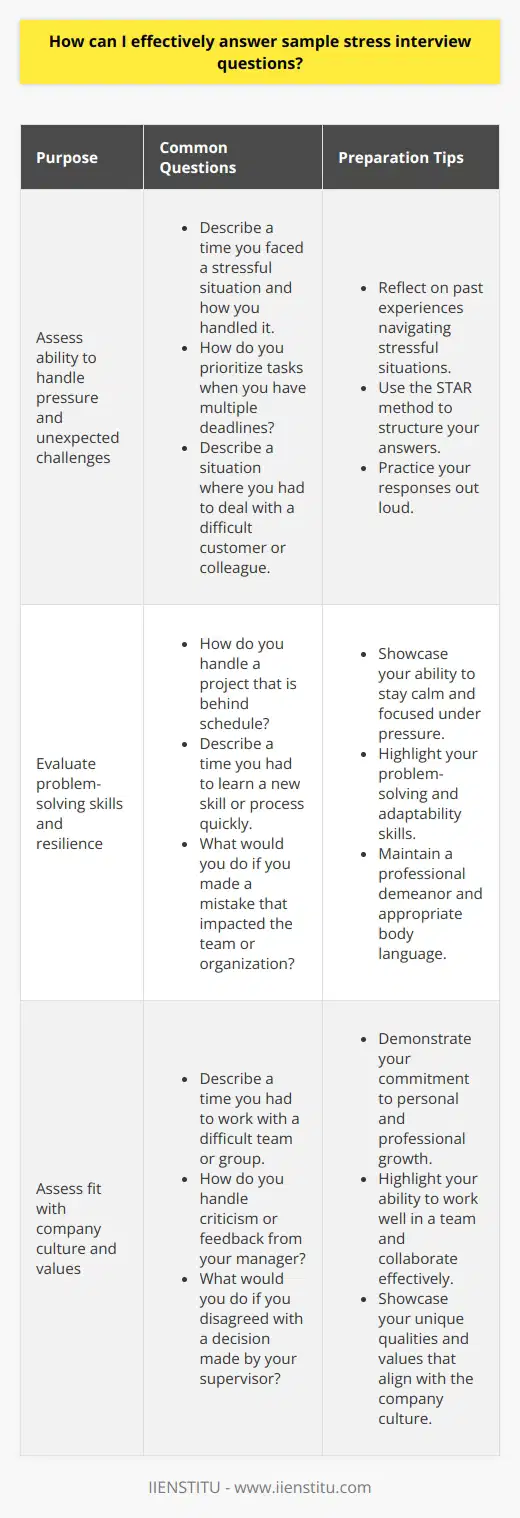
What are some strategies for managing stress during a sample stress interview?
Stress interviews can be challenging, but there are several strategies you can employ to manage your stress effectively. First, it's essential to prepare thoroughly for the interview by researching the company and practicing common interview questions. This preparation will boost your confidence and help you feel more in control during the interview. Additionally, practicing stress-management techniques such as deep breathing, progressive muscle relaxation, and positive self-talk can help you stay calm and focused.
Maintaining a Positive Mindset
Maintaining a positive mindset is crucial during a stress interview. Remember that the interviewer is not trying to attack you personally; they are simply assessing how you handle pressure. Try to reframe the situation as an opportunity to showcase your problem-solving skills and resilience. If you find yourself becoming overwhelmed, take a moment to pause, breathe deeply, and collect your thoughts before responding.
Staying Focused on Your Goals
During the interview, stay focused on your goals and the reasons why you want the job. This focus will help you maintain motivation and perspective, even if the questions become challenging. Remember to highlight your strengths, accomplishments, and the value you can bring to the organization.
Practicing Active Listening
Active listening is an important skill to demonstrate during a stress interview. Pay close attention to the questions being asked and take a moment to consider your response before answering. If you're unsure about a question, don't be afraid to ask for clarification. This shows that you're engaged and willing to ensure you provide a relevant and accurate response.
Maintaining Professionalism
Throughout the interview, it's essential to maintain professionalism, even if the questions become challenging or confrontational. Avoid becoming defensive or argumentative, and instead, focus on providing clear, concise, and honest responses. If you disagree with a statement or question, express your perspective calmly and respectfully, backing up your opinion with examples or evidence when possible.
Using Body Language to Your Advantage
Your body language can also play a significant role in managing stress during the interview. Sit up straight, maintain eye contact, and use open, confident body language. This will help you project confidence and competence, even if you're feeling nervous internally.
Conclusion
By employing these strategies, you can effectively manage stress during a sample stress interview. Remember to prepare thoroughly, maintain a positive mindset, practice active listening, and use your body language to project confidence. Stay focused on your goals and the value you can bring to the organization, and you'll be well-equipped to handle even the most challenging stress interview questions.
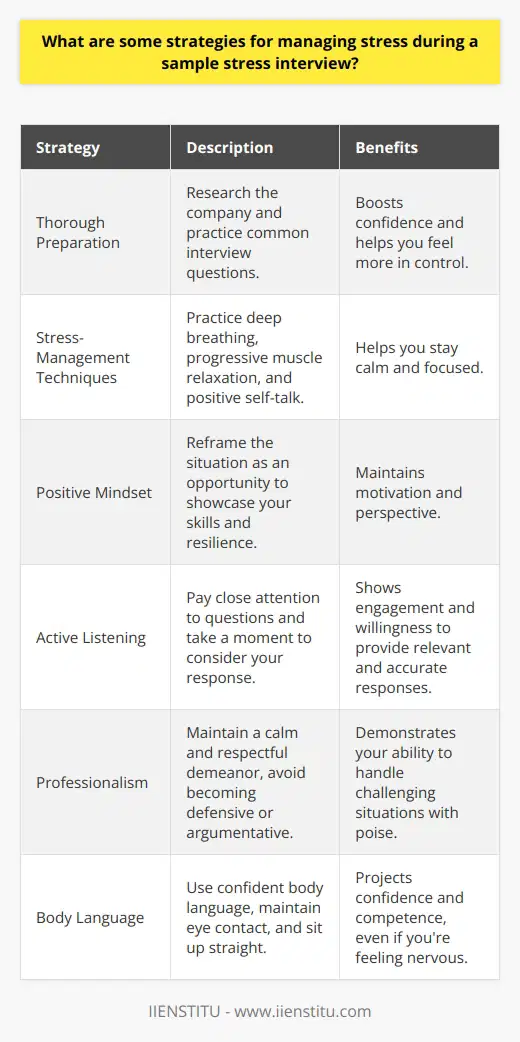
How do you typically cope with stress and pressure in your work environment?
Coping with stress and pressure in the work environment is crucial for maintaining productivity and well-being. Effective strategies for managing stress include prioritizing tasks, setting realistic goals, and communicating openly with colleagues and supervisors. Engaging in regular physical exercise, such as yoga or jogging, can help reduce stress levels and improve overall health.
Time Management Techniques
One of the most important ways to cope with stress in the workplace is through effective time management. This involves breaking down large tasks into smaller, more manageable steps and setting clear deadlines for completion. Prioritizing tasks based on urgency and importance can also help reduce feelings of being overwhelmed.
Another helpful technique is learning to say "no" when necessary. Taking on too many responsibilities can lead to increased stress levels. It's important to be realistic about what you can accomplish within a given timeframe.
Maintaining Work-Life Balance
Achieving a healthy work-life balance is essential for managing stress and pressure in the work environment. This means setting boundaries between work and personal life, such as avoiding checking work emails outside of office hours. Taking regular breaks throughout the day, even if just for a few minutes, can help refresh the mind and reduce stress.
Engaging in hobbies and activities outside of work can also provide a much-needed outlet for stress relief. This could include reading, painting, or spending time with friends and family.
Mindfulness and Relaxation Techniques
Practicing mindfulness and relaxation techniques can be highly effective in reducing stress levels. Deep breathing exercises, meditation, and progressive muscle relaxation are all simple techniques that can be done anywhere, anytime. These practices help to calm the mind and body, reducing feelings of anxiety and tension.
Seeking Support
It's important to remember that you don't have to cope with stress and pressure alone. Seeking support from colleagues, supervisors, or a professional counselor can provide valuable guidance and perspective. Many workplaces offer employee assistance programs that provide confidential counseling services for work-related stress and other personal issues.
Maintaining Physical Health
Taking care of your physical health is another important aspect of managing stress in the workplace. Regular exercise, a balanced diet, and adequate sleep are all crucial for maintaining energy levels and reducing feelings of stress. Even small changes, such as taking a short walk during lunch breaks or choosing healthy snack options, can make a big difference.
Conclusion
Coping with stress and pressure in the work environment requires a multi-faceted approach. By implementing effective time management techniques, maintaining a healthy work-life balance, practicing mindfulness and relaxation, seeking support when needed, and taking care of physical health, individuals can successfully navigate the challenges of the modern workplace. Remember, managing stress is an ongoing process that requires patience and persistence.
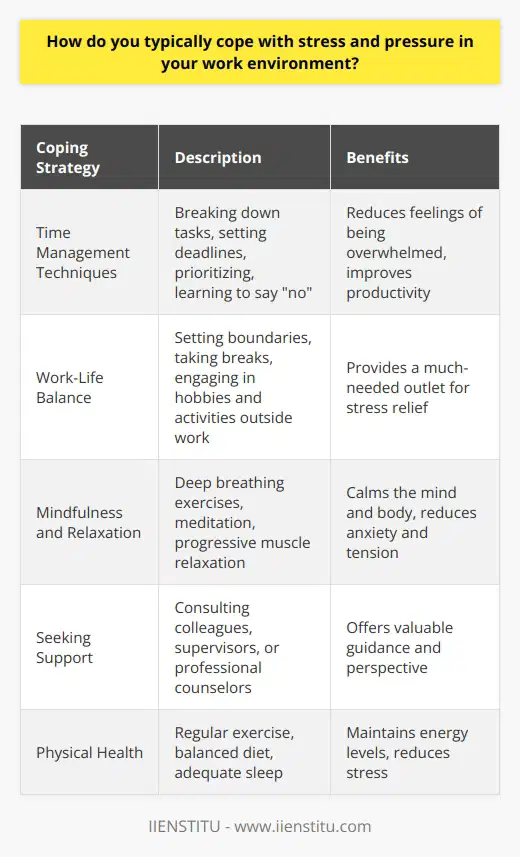
What strategies have you found effective in managing stress and pressure on the job?
Managing stress and pressure in the workplace is crucial for maintaining productivity and overall well-being. Several strategies can be employed to effectively cope with job-related stress. One approach is to prioritize tasks and create a manageable schedule. By focusing on the most critical responsibilities and breaking them down into smaller, achievable goals, individuals can reduce feelings of overwhelm. Additionally, effective time management techniques, such as the Pomodoro Technique, can help maintain focus and prevent burnout.
Importance of Self-Care
Engaging in regular self-care activities is another essential strategy for managing stress. This includes taking short breaks throughout the workday to stretch, meditate, or practice deep breathing exercises. These brief moments of relaxation can help clear the mind and restore energy levels. Moreover, maintaining a healthy work-life balance is vital. Setting boundaries between work and personal life, such as avoiding checking work emails outside of office hours, can prevent job-related stress from spilling into other areas of life.
Cultivating a Support System
Building a strong support system at work can also alleviate stress and pressure. Developing positive relationships with colleagues and supervisors can create a sense of camaraderie and provide opportunities for collaboration and problem-solving. When faced with challenging situations, seeking guidance or assistance from trusted coworkers can help distribute the workload and provide fresh perspectives. Additionally, participating in team-building activities or social events can foster a sense of belonging and reduce feelings of isolation.
Effective Communication and Conflict Resolution
Effective communication is key to managing stress in the workplace. Clearly expressing concerns, expectations, and boundaries can prevent misunderstandings and conflicts from arising. When faced with a difficult conversation or conflict, approaching the situation with a calm and open mindset can facilitate productive resolution. Active listening, empathy, and a willingness to compromise are essential skills for navigating workplace challenges and maintaining positive relationships with colleagues.
Embracing Mindfulness and Resilience
Incorporating mindfulness practices into daily work routines can significantly reduce stress levels. This can involve taking a few minutes each day to focus on the present moment, acknowledging thoughts and emotions without judgment, and practicing gratitude. Developing resilience is another critical aspect of managing stress. Recognizing that setbacks and challenges are a normal part of the job and viewing them as opportunities for growth and learning can help maintain a positive outlook and prevent feelings of defeat.
Seeking Professional Support
When stress and pressure become overwhelming, seeking professional support can be a valuable strategy. Many workplaces offer employee assistance programs that provide confidential counseling services. Talking to a therapist or counselor can help individuals develop coping mechanisms, gain new perspectives, and address underlying issues that may be contributing to job-related stress. Additionally, attending stress management workshops or training sessions can provide practical tools and techniques for dealing with workplace challenges.
In conclusion, managing stress and pressure on the job requires a multifaceted approach. By prioritizing self-care, cultivating a support system, communicating effectively, embracing mindfulness and resilience, and seeking professional support when needed, individuals can successfully navigate the demands of the workplace and maintain their well-being.
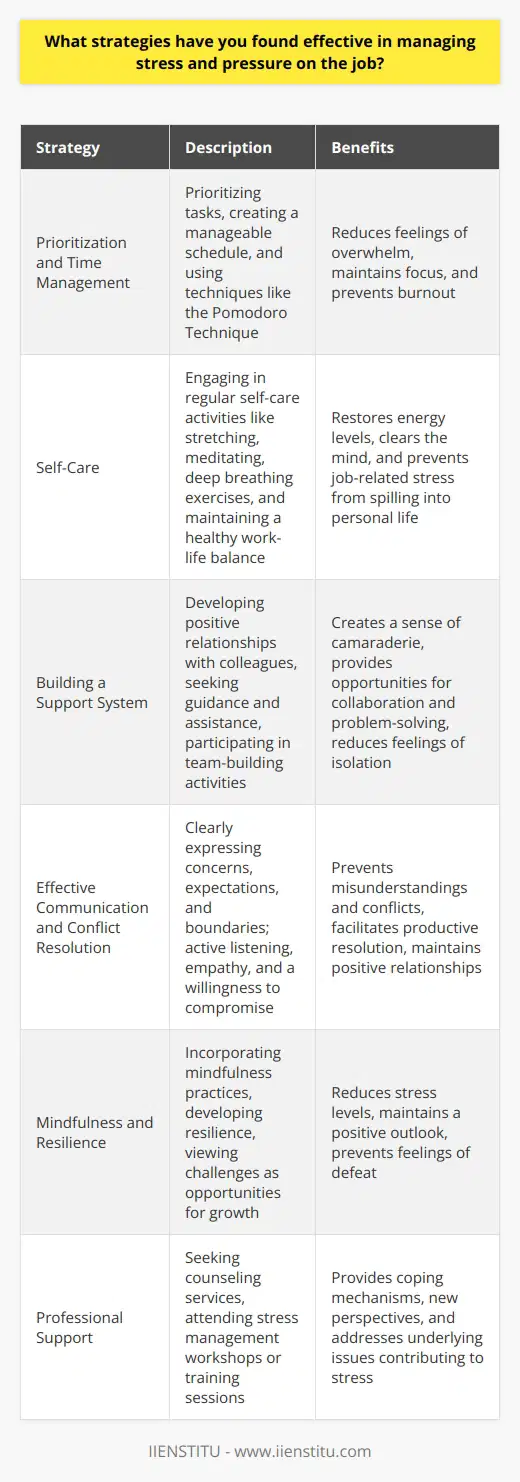
Can you describe a situation where you successfully handled a high-pressure situation at work?
Handling high-pressure situations at work requires a combination of calmness, adaptability, and effective problem-solving skills. One such situation I successfully navigated occurred during a critical project deadline. As the team leader, I had to manage multiple tasks, coordinate with different departments, and ensure timely delivery.
Assessing the Situation
When faced with the high-pressure situation, the first step I took was to assess the challenges at hand. I quickly identified the key obstacles, such as limited resources and conflicting priorities. By understanding the scope of the problem, I could develop a strategic plan to address it.
Prioritizing Tasks
To effectively handle the high-pressure situation, I prioritized tasks based on their urgency and importance. I created a clear roadmap, outlining the critical milestones and deadlines. This allowed me to focus on the most pressing issues first, ensuring that the project stayed on track.
Communicating Effectively
Clear communication was crucial in managing the high-pressure situation. I regularly updated my team and stakeholders on the project's progress. I encouraged open dialogue, allowing team members to voice their concerns and ideas. This fostered a collaborative environment where everyone worked together towards a common goal.
Delegating Responsibilities
To alleviate the pressure and ensure efficient task completion, I delegated responsibilities to team members based on their strengths. I provided clear instructions and support, empowering them to take ownership of their roles. This distributed the workload and allowed the team to work more effectively.
Staying Calm and Focused
Maintaining a calm and focused demeanor was essential in handling the high-pressure situation. I remained composed, even when faced with setbacks or unexpected challenges. I encouraged my team to stay positive and focused on finding solutions rather than dwelling on problems.
Adapting to Changes
In high-pressure situations, change is inevitable. I remained flexible and open to adjusting our approach when necessary. I quickly adapted to new information or changing circumstances, ensuring that the project continued to move forward.
Leveraging Resources
To successfully handle the high-pressure situation, I leveraged all available resources. I sought guidance from experienced colleagues and utilized technology to streamline processes. By making the most of the resources at hand, we were able to overcome obstacles more efficiently.
Celebrating Milestones
Throughout the high-pressure situation, I made sure to acknowledge and celebrate the team's progress and milestones. Recognizing small victories boosted morale and motivation, keeping everyone engaged and committed to the project's success.
By employing these strategies, I successfully handled the high-pressure situation at work. The project was delivered on time, meeting all the required specifications. The experience taught me the importance of effective leadership, communication, and adaptability in managing challenging circumstances.
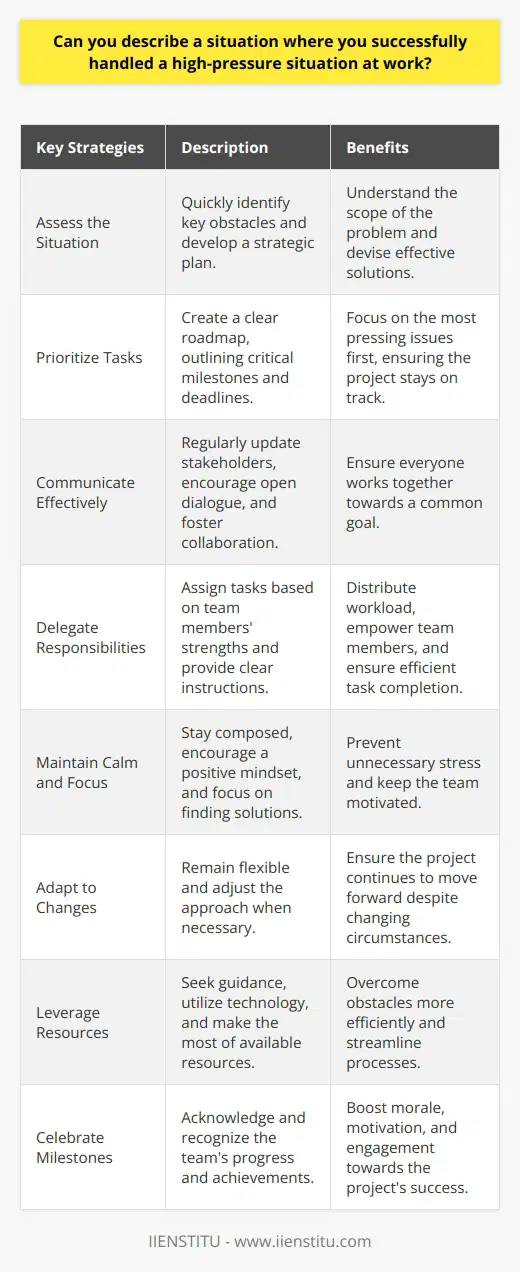
How do you handle stressful situations at work?
Handling stressful situations at work requires a combination of strategies to maintain productivity and well-being. Firstly, it's essential to identify the sources of stress and assess their impact on your performance. This introspection allows you to prioritize tasks and allocate your resources effectively. Secondly, developing strong time management skills is crucial in mitigating stress. By creating a structured schedule and breaking down complex projects into manageable tasks, you can avoid feeling overwhelmed.
Effective Communication and Support
Open communication with colleagues and supervisors is another key aspect of managing stress in the workplace. Don't hesitate to seek clarification on expectations or ask for help when needed. Building a support network of trusted coworkers can provide a valuable outlet for discussing challenges and brainstorming solutions. Additionally, learning to delegate tasks appropriately can alleviate some of the burden and allow you to focus on high-priority responsibilities.
Maintaining Work-Life Balance
Establishing clear boundaries between work and personal life is essential for reducing stress. Make a conscious effort to disconnect from work-related matters outside of designated hours. Engage in hobbies, exercise, or other relaxation techniques to recharge your batteries and maintain a healthy perspective. Regular breaks throughout the workday, even short ones, can help you refocus and approach tasks with renewed energy.
Developing Resilience and Adaptability
Cultivating a resilient mindset is vital for navigating stressful situations at work. Embrace challenges as opportunities for growth and learning. Adopt a solution-oriented approach, focusing on what you can control and letting go of what you cannot. Practice adaptability by being open to change and willing to adjust your strategies when necessary. Celebrate your successes, no matter how small, to maintain a positive outlook and boost your confidence.
Seeking Professional Help
If work-related stress becomes overwhelming and affects your mental health, don't hesitate to seek professional support. Many organizations offer employee assistance programs that provide confidential counseling services. Talking to a therapist or counselor can help you develop coping mechanisms and gain a fresh perspective on your challenges. Remember, taking care of your well-being is not a sign of weakness but rather a proactive step towards success.
By implementing these strategies and maintaining a proactive approach, you can effectively handle stressful situations at work. Prioritize self-care, foster positive relationships, and continuously develop your skills to navigate the demands of your professional life with greater ease and resilience.
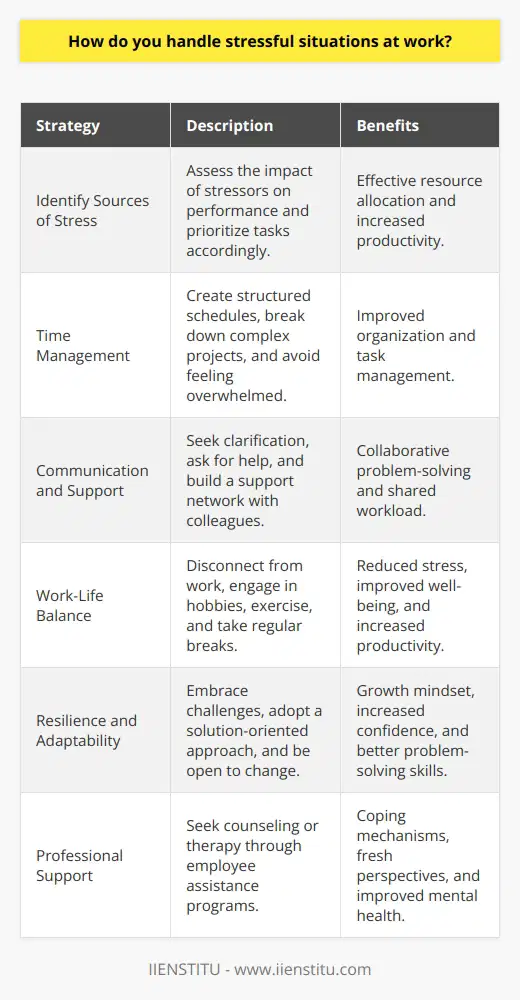
What are some effective strategies for managing stress in high-pressure environments?
Managing stress in high-pressure environments is crucial for maintaining well-being and productivity. Several strategies can help individuals cope with stress effectively. One approach is to prioritize tasks and focus on the most critical ones first. This helps to reduce feelings of overwhelm and allows for a sense of accomplishment. Another strategy is to practice mindfulness techniques, such as deep breathing or meditation. These practices can help to calm the mind and body, reducing the physiological effects of stress.
Importance of Self-Care
Self-care is essential for managing stress in high-pressure environments. Engaging in regular exercise, eating a balanced diet, and getting enough sleep are all important aspects of self-care. Exercise releases endorphins, which can improve mood and reduce stress. A balanced diet provides the nutrients needed for optimal brain function and stress management. Adequate sleep is crucial for cognitive function and emotional regulation. Making time for hobbies and leisure activities can also help to reduce stress and improve overall well-being.
Establishing Boundaries
Setting boundaries is another effective strategy for managing stress in high-pressure environments. This involves learning to say no to non-essential tasks and delegating responsibilities when possible. It also means setting aside time for breaks and self-care activities. Establishing clear boundaries between work and personal life can help to reduce feelings of overwhelm and prevent burnout.
Seeking Support
Seeking support from others is an important strategy for managing stress in high-pressure environments. This can involve talking to a trusted friend or family member, joining a support group, or seeking professional help from a therapist or counselor. Sharing concerns and feelings with others can help to reduce feelings of isolation and provide a fresh perspective on challenges.
Reframing Thoughts
Finally, reframing thoughts can be an effective strategy for managing stress in high-pressure environments. This involves challenging negative thoughts and replacing them with more positive and realistic ones. For example, instead of thinking "I can't handle this," one could reframe the thought as "This is challenging, but I have the skills and resources to cope." Reframing thoughts can help to reduce feelings of anxiety and improve overall outlook.
In conclusion, managing stress in high-pressure environments requires a multifaceted approach. Prioritizing tasks, practicing mindfulness, engaging in self-care, establishing boundaries, seeking support, and reframing thoughts are all effective strategies for coping with stress. By implementing these strategies, individuals can improve their well-being and performance in high-pressure environments.
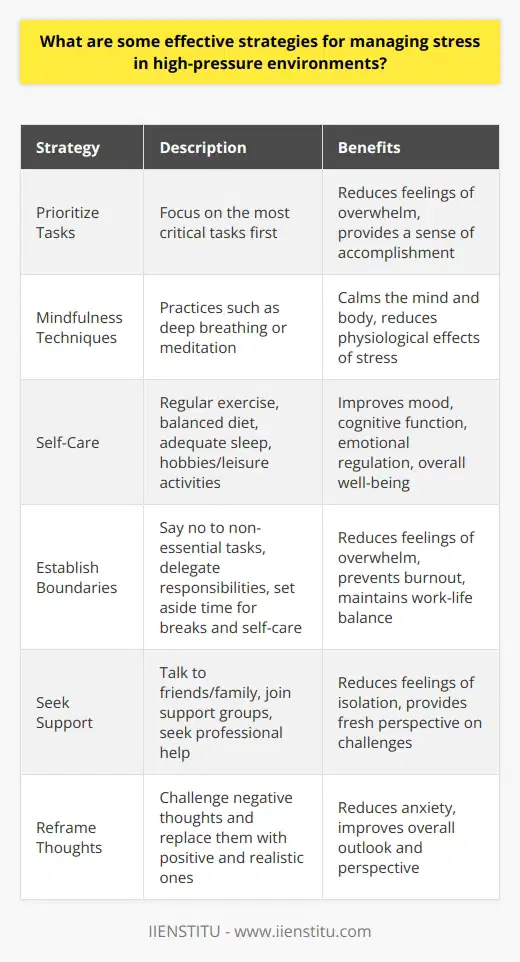
How can one maintain a positive attitude and calm demeanor during stressful situations?
Maintaining a positive attitude and calm demeanor during stressful situations is crucial for personal well-being and effective problem-solving. One key strategy is to practice mindfulness, which involves focusing on the present moment and accepting thoughts and emotions without judgment. Regular mindfulness meditation can help individuals develop a greater sense of clarity and perspective, enabling them to approach stressful situations with a more balanced outlook.
Cognitive Reframing
Another essential technique for maintaining positivity during stress is cognitive reframing. This involves consciously challenging negative thoughts and reinterpreting situations in a more positive or neutral light. By questioning the validity of negative self-talk and considering alternative perspectives, individuals can reduce the emotional impact of stressful events and maintain a more optimistic mindset.
Self-Care Practices
Engaging in regular self-care practices is also vital for promoting a positive attitude during times of stress. This may include activities such as exercise, healthy eating, sufficient sleep, and engaging in hobbies or interests that bring joy and relaxation. By prioritizing self-care, individuals can build resilience and maintain a sense of balance, even in the face of challenging circumstances.
Social Support
Seeking social support from friends, family, or professionals can also help individuals maintain a positive outlook during stressful situations. Sharing concerns and feelings with trusted others can provide a sense of validation and connection, reducing feelings of isolation and helplessness. Additionally, surrounding oneself with positive and supportive individuals can help foster a more optimistic and resilient mindset.
Problem-Solving Strategies
Finally, employing effective problem-solving strategies can help individuals maintain a calm demeanor when faced with stressful situations. This involves breaking down problems into smaller, manageable components and developing a step-by-step plan for addressing each aspect. By focusing on solutions rather than dwelling on the problem itself, individuals can maintain a sense of control and progress, even in the midst of difficult circumstances.
In conclusion, maintaining a positive attitude and calm demeanor during stressful situations requires a multifaceted approach that includes mindfulness, cognitive reframing, self-care, social support, and effective problem-solving strategies. By cultivating these skills and practices, individuals can build resilience and navigate life's challenges with greater ease and positivity.
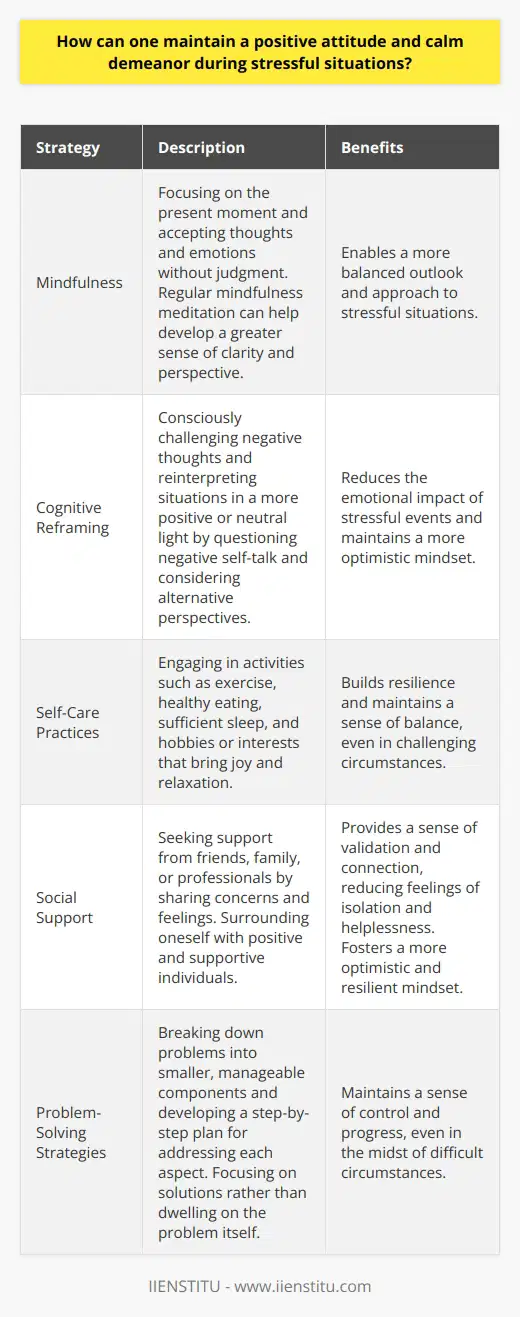
How do you handle stress and pressure as a fresher in a new work environment?
As a fresher in a new work environment, handling stress and pressure can be challenging. However, there are several strategies that can help you cope with these challenges effectively. First and foremost, it is essential to maintain a positive attitude and approach towards your work. This can help you stay motivated and focused, even in the face of difficult situations.
Prioritize and Manage Your Time
One of the most important things you can do to handle stress and pressure is to prioritize your tasks and manage your time effectively. Make a list of your tasks and prioritize them based on their importance and urgency. Use a planner or a digital tool to keep track of your deadlines and commitments. Break down larger tasks into smaller, manageable chunks to avoid feeling overwhelmed.
Communicate with Your Colleagues and Supervisors
Another key strategy for handling stress and pressure is to communicate effectively with your colleagues and supervisors. Don't be afraid to ask for help or clarification when you need it. Seek feedback on your work and be open to constructive criticism. Building good relationships with your co-workers can also help you feel more supported and less stressed in the workplace.
Take Care of Your Physical and Mental Health
Taking care of your physical and mental health is crucial for managing stress and pressure. Make sure to get enough sleep, eat a healthy diet, and exercise regularly. Take breaks throughout the day to stretch, walk around, or practice deep breathing exercises. Engage in activities that you enjoy outside of work, such as hobbies or spending time with friends and family.
Learn from Your Mistakes and Celebrate Your Successes
As a fresher, it is natural to make mistakes as you learn and grow in your new role. Don't be too hard on yourself when this happens. Instead, try to learn from your mistakes and use them as opportunities for growth and improvement. At the same time, don't forget to celebrate your successes and achievements, no matter how small they may seem.
Seek Support When Needed
Finally, don't hesitate to seek support when you need it. Many workplaces offer employee assistance programs or counseling services that can help you manage stress and other personal or professional challenges. You can also reach out to a trusted friend, family member, or mentor for advice and support.
Conclusion
In conclusion, handling stress and pressure as a fresher in a new work environment requires a combination of strategies, including maintaining a positive attitude, prioritizing and managing your time, communicating effectively with colleagues and supervisors, taking care of your physical and mental health, learning from your mistakes, celebrating your successes, and seeking support when needed. By implementing these strategies consistently, you can build resilience, adaptability, and success in your new role.
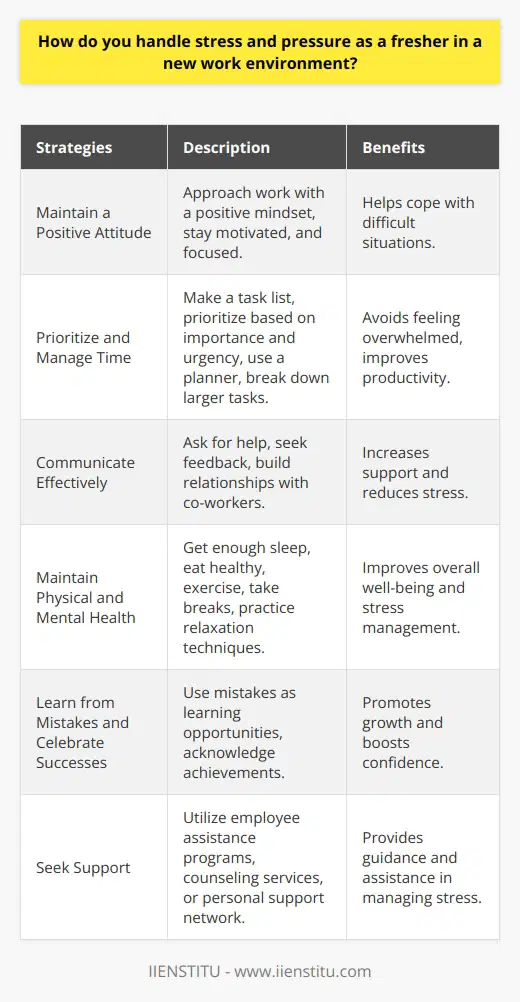
What strategies can a fresher employ to effectively manage stress and pressure in their first job?
Freshers entering their first job often face significant stress and pressure as they adapt to the new environment and responsibilities. Effective stress management strategies are crucial for maintaining mental well-being and optimizing job performance. This paragraph explores various techniques that freshers can employ to successfully navigate the challenges of their first professional role.
Prioritize Self-Care
Self-care is paramount in managing stress and pressure. Freshers should prioritize regular exercise, a balanced diet, and sufficient sleep. Engaging in hobbies and relaxation techniques, such as meditation or deep breathing exercises, can help reduce anxiety and promote a sense of calm.
Establish a Support Network
Building a strong support network is essential for freshers. Seeking guidance from mentors, colleagues, and supervisors can provide valuable insights and help alleviate stress. Freshers should also cultivate friendships with coworkers who can offer emotional support and advice navigating the workplace.
Effective Time Management
Effective time management is key to reducing stress. Freshers should prioritize tasks, set realistic goals, and break projects into manageable steps. Using tools like calendars, to-do lists, and productivity apps can help optimize time usage and minimize last-minute scrambles.
Open Communication
Freshers should foster open communication with their supervisors and colleagues. Asking questions, seeking clarification, and expressing concerns can prevent misunderstandings and alleviate stress. Regular check-ins with managers can help freshers stay on track and receive constructive feedback.
Embrace a Growth Mindset
Adopting a growth mindset is crucial for managing stress. Freshers should view challenges as opportunities for learning and development. Embracing mistakes as part of the learning process and focusing on continuous improvement can help reduce self-imposed pressure and foster resilience.
Set Boundaries
Setting clear boundaries between work and personal life is essential for maintaining balance. Freshers should establish specific work hours and avoid constantly checking emails or taking work home. Engaging in activities outside of work, such as hobbies or socializing with friends and family, can provide necessary respite and prevent burnout.
Practice Mindfulness
Mindfulness techniques can be highly effective in managing stress. Freshers can practice mindfulness by focusing on the present moment, observing thoughts without judgment, and engaging in deep breathing exercises. Incorporating short mindfulness breaks throughout the workday can help maintain a sense of calm and clarity.
Seek Professional Help
If stress becomes overwhelming, freshers should not hesitate to seek professional help. Many organizations offer employee assistance programs that provide counseling services and support for mental health. Talking to a therapist or counselor can provide valuable tools and strategies for managing stress and maintaining overall well-being.
By implementing these strategies, freshers can effectively manage stress and pressure in their first job. Prioritizing self-care, building a strong support network, practicing effective time management, embracing a growth mindset, setting boundaries, practicing mindfulness, and seeking professional help when needed can all contribute to a successful and fulfilling professional journey.
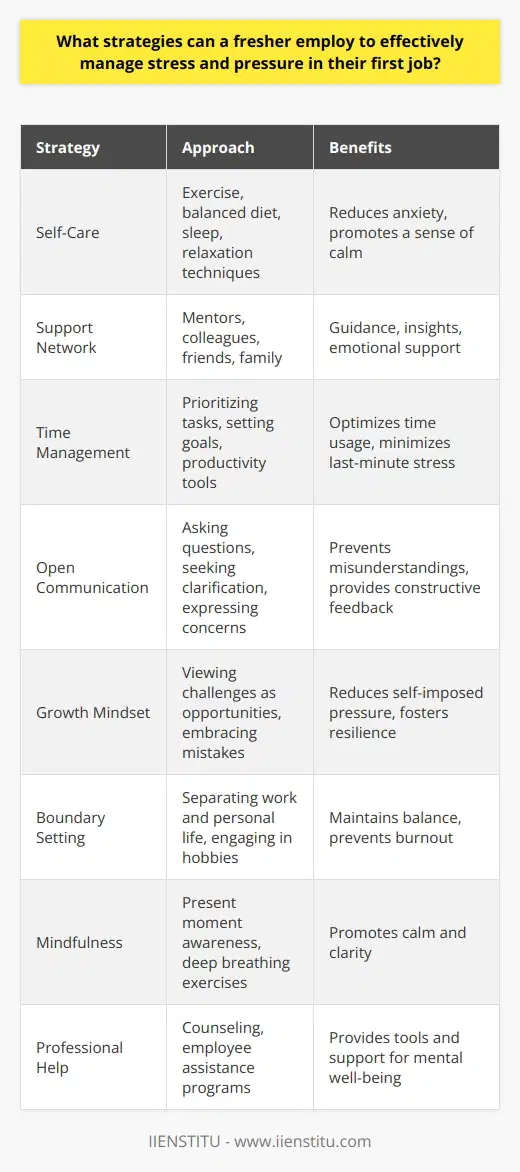
As a fresher, how can you maintain a healthy work-life balance while dealing with stress and pressure?
Maintaining a healthy work-life balance is crucial for freshers to manage stress and pressure effectively. Prioritizing tasks, setting realistic goals, and creating a schedule can help you stay organized and focused. Effective time management allows you to allocate sufficient time for work, personal life, and relaxation. It's essential to establish clear boundaries between work and personal life to avoid burnout and maintain mental well-being.
Strategies for Stress Management
Incorporating stress management techniques into your daily routine can help you cope with pressure. Regular exercise, meditation, deep breathing, and engaging in hobbies can reduce stress levels and improve overall well-being. Building a support system of colleagues, friends, and family members can provide valuable guidance and emotional support during challenging times. Don't hesitate to reach out for help when needed.
Importance of Self-Care
Prioritizing self-care is essential for maintaining a healthy work-life balance. Engage in activities that bring you joy and relaxation, such as reading, listening to music, or spending time in nature. Ensure you get enough sleep, maintain a balanced diet, and stay hydrated to support your physical and mental health. Taking regular breaks throughout the day can help you recharge and maintain productivity.
Effective Communication
Open and honest communication with your supervisor and colleagues is key to managing expectations and workload. Regularly discuss your goals, progress, and any challenges you face. Seek feedback and guidance to improve your performance and clarify any uncertainties. Effective communication can help you build strong professional relationships and create a supportive work environment.
Continuous Learning and Growth
Embrace opportunities for learning and professional development to enhance your skills and knowledge. Attend training sessions, workshops, and conferences to stay updated with industry trends and best practices. Continuously learning and growing can boost your confidence, reduce stress, and improve your overall job satisfaction.
Flexibility and Adaptability
As a fresher, it's important to be flexible and adaptable in the workplace. Embrace change and be open to new ideas and approaches. Be willing to take on new responsibilities and challenges that align with your career goals. Maintaining a positive attitude and being proactive in problem-solving can help you navigate stressful situations effectively.
Remember, achieving a healthy work-life balance is an ongoing process that requires consistent effort and self-reflection. Regularly assess your priorities, make necessary adjustments, and communicate your needs to maintain a sustainable and fulfilling professional and personal life.
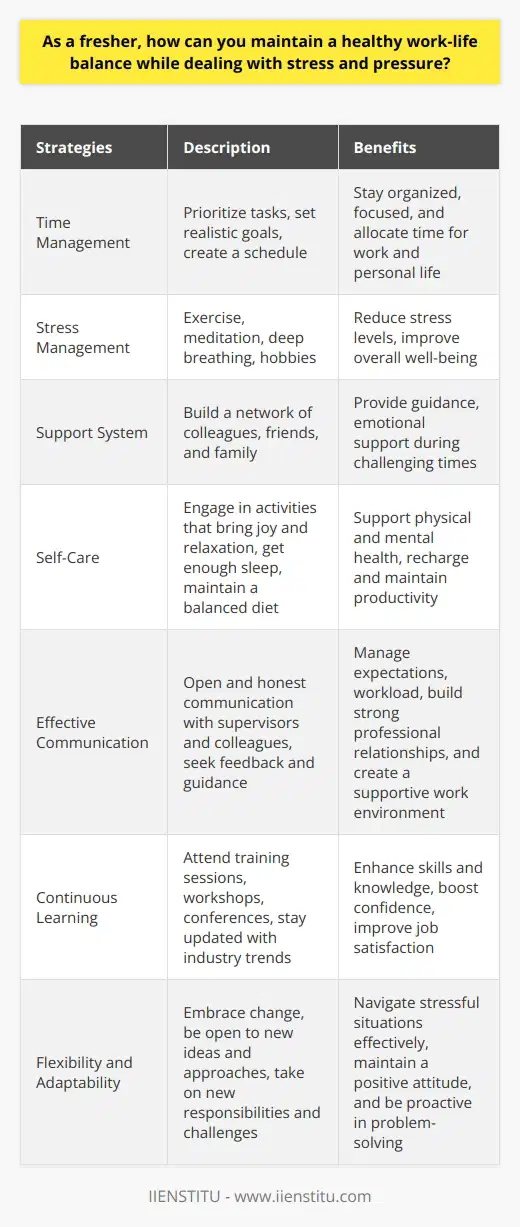
How do you handle stress and pressure in the workplace?
Stress and pressure are common challenges faced by individuals in the workplace. Effectively managing these factors is crucial for maintaining productivity, well-being, and overall job satisfaction. This paragraph explores various strategies and techniques that can be employed to handle stress and pressure in professional settings.
Identifying Stressors
The first step in managing stress and pressure is to identify the specific triggers causing these feelings. Take a moment to reflect on the situations or tasks that generate the most stress in your work environment. By recognizing these stressors, you can develop targeted strategies to address them effectively.
Time Management and Prioritization
Effective time management and prioritization are essential for reducing stress and pressure in the workplace. Create a clear schedule and allocate sufficient time for each task. Use tools like to-do lists or productivity apps to stay organized and focused. Prioritize tasks based on their importance and urgency, tackling the most critical items first.
Breaking Tasks into Manageable Steps
When faced with complex or overwhelming projects, break them down into smaller, manageable steps. This approach makes the workload feel more achievable and reduces the associated stress. Set realistic goals and deadlines for each step, and celebrate small victories along the way.
Effective Communication
Open and clear communication with colleagues and supervisors can alleviate stress and pressure in the workplace. Don't hesitate to seek clarification or assistance when needed. Regularly update your team on your progress and any challenges you encounter. By maintaining transparent communication, you foster a supportive and collaborative work environment.
Delegation and Seeking Support
Recognize when tasks can be delegated to other team members or when additional support is required. Collaborating with colleagues and distributing workload can greatly reduce individual stress levels. Don't be afraid to ask for help when necessary; it demonstrates strength and a willingness to work together towards common goals.
Self-Care and Stress-Relief Techniques
Prioritizing self-care is vital for managing stress and pressure in the workplace. Engage in activities that promote relaxation and stress relief, such as deep breathing exercises, meditation, or physical exercise. Take regular breaks throughout the day to recharge and maintain a positive mindset. Establish clear boundaries between work and personal life to ensure adequate rest and rejuvenation.
Maintaining a Healthy Work-Life Balance
Strive to maintain a healthy work-life balance by setting aside time for hobbies, social activities, and personal interests outside of work. Engage in pursuits that bring you joy and help you disconnect from work-related stress. A well-rounded lifestyle contributes to overall well-being and enhances your ability to handle pressure in the workplace.
Seeking Professional Support
If stress and pressure become overwhelming and begin to impact your mental health, don't hesitate to seek professional support. Many organizations offer employee assistance programs (EAPs) that provide confidential counseling and resources for stress management. Talking to a therapist or counselor can provide valuable tools and strategies for coping with workplace challenges.
By implementing these strategies and techniques, individuals can effectively handle stress and pressure in the workplace. Remember, managing stress is an ongoing process that requires self-awareness, proactive measures, and a commitment to self-care. By prioritizing well-being and adopting healthy coping mechanisms, professionals can thrive in even the most demanding work environments.
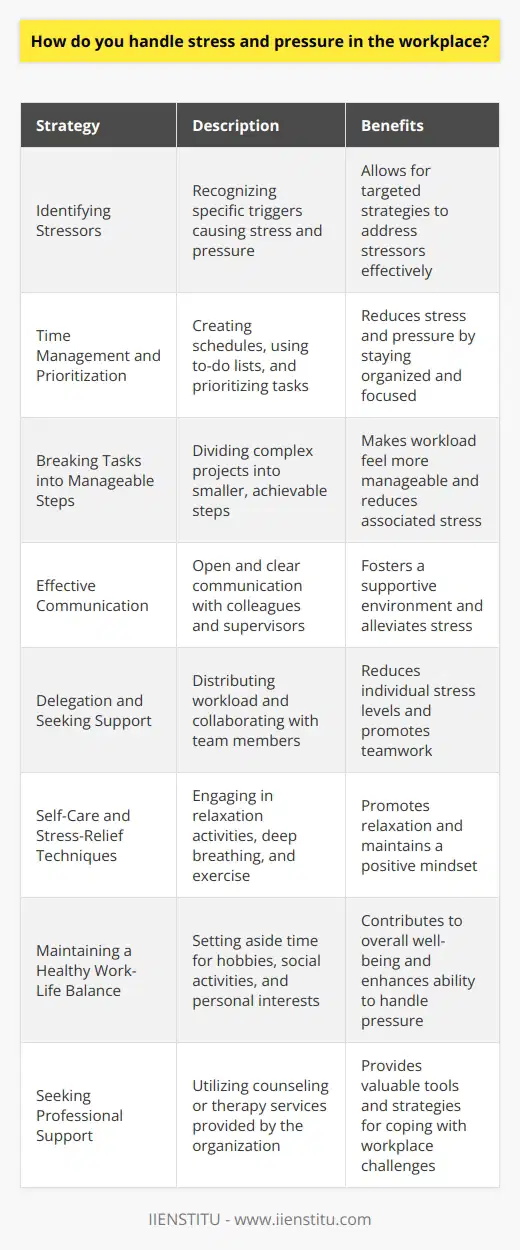
What strategies do you employ to effectively manage stress and pressure?
Effective stress management involves a combination of techniques that help individuals cope with the demands of daily life. One crucial strategy is to prioritize tasks and manage time effectively, which can reduce feelings of being overwhelmed. By focusing on the most important and urgent tasks first, individuals can ensure that they are making progress towards their goals. Another essential aspect of stress management is engaging in regular physical exercise, which has been shown to reduce stress levels and improve overall well-being. Exercise releases endorphins, which are natural mood-boosters, and can help individuals feel more energized and capable of handling stressful situations.
Mindfulness and Relaxation Techniques
Practicing mindfulness and relaxation techniques, such as deep breathing, meditation, or yoga, can also be highly effective in managing stress. These practices help individuals focus on the present moment, reducing anxiety and worry about future events. By taking a few minutes each day to engage in these activities, individuals can cultivate a sense of inner calm and resilience. Additionally, maintaining a healthy work-life balance is crucial for managing stress and pressure. Setting clear boundaries between work and personal life, and making time for hobbies, social activities, and rest, can help individuals recharge and approach stressful situations with a fresh perspective.
Support Systems and Self-Care
Building a strong support system of family, friends, or colleagues can also be an effective strategy for managing stress. Talking about stressors and seeking advice from trusted individuals can help put problems into perspective and generate solutions. It is also essential to practice self-care by maintaining a healthy diet, getting enough sleep, and engaging in activities that bring joy and relaxation. By prioritizing self-care, individuals can build resilience and be better equipped to handle stressful situations when they arise.
Cognitive Reframing and Problem-Solving
Another effective strategy for managing stress is cognitive reframing, which involves changing one's perspective on a stressful situation. By looking at challenges as opportunities for growth and learning, individuals can reduce the emotional impact of stress. Additionally, breaking down large, complex problems into smaller, more manageable tasks can make them feel less overwhelming. Developing problem-solving skills, such as brainstorming solutions and seeking help when needed, can also help individuals navigate stressful situations more effectively.
Continuous Learning and Adaptability
Finally, continuously learning and adapting to new situations can help individuals build resilience and effectively manage stress. By staying curious, acquiring new skills, and embracing change, individuals can feel more confident in their ability to handle challenges. Recognizing that stress is a natural part of life and that it can be managed through a variety of strategies can help individuals maintain a positive outlook and approach stressful situations with greater ease.
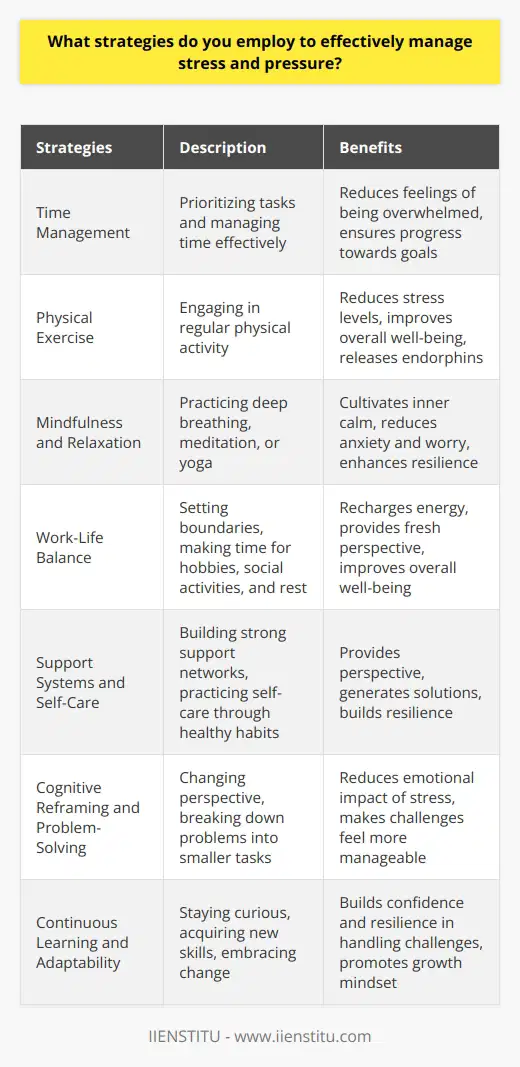
In what ways do you cope with stressful situations and pressure to maintain productivity?
Coping with stressful situations and maintaining productivity can be challenging, but there are several effective strategies to manage pressure. One approach is to prioritize tasks and focus on the most critical ones first. This helps to reduce feelings of being overwhelmed and ensures that important responsibilities are addressed promptly. Another valuable technique is to practice mindfulness and meditation, which can promote relaxation and mental clarity. Engaging in regular physical exercise is also beneficial, as it releases endorphins and reduces stress levels. Additionally, seeking support from friends, family, or colleagues can provide a sense of connection and help to put problems into perspective.
Time Management Techniques
Effective time management is crucial for coping with stress and maintaining productivity. One strategy is to create a daily schedule and allocate specific time slots for different tasks. This helps to structure the day and ensures that sufficient time is dedicated to important activities. Another technique is to break larger projects into smaller, manageable steps. This makes the overall task less daunting and allows for a sense of progress and accomplishment. It is also essential to set realistic goals and deadlines, taking into account available resources and potential obstacles. By managing time effectively, individuals can reduce stress and increase their overall productivity.
Prioritizing Self-Care
Prioritizing self-care is essential for managing stress and maintaining productivity. This includes getting enough sleep, eating a balanced diet, and engaging in activities that promote relaxation. Taking regular breaks throughout the day can also help to recharge and refocus the mind. It is important to set boundaries and learn to say no to non-essential tasks or commitments. This helps to prevent overextending oneself and reduces the risk of burnout. Engaging in hobbies or activities that bring joy and fulfillment can also provide a much-needed break from work-related stress. By prioritizing self-care, individuals can improve their overall well-being and enhance their ability to cope with pressure.
Seeking Professional Support
In some cases, seeking professional support may be necessary to effectively cope with stress and maintain productivity. This can include speaking with a therapist or counselor who can provide guidance and strategies for managing difficult emotions. Employee assistance programs offered by some organizations can also be a valuable resource, providing confidential support and referrals to mental health professionals. Attending stress management workshops or seminars can also provide practical tools and techniques for coping with pressure. By seeking professional support when needed, individuals can gain valuable insights and develop personalized strategies for managing stress and maintaining productivity.
Cultivating Resilience
Cultivating resilience is an important aspect of coping with stress and maintaining productivity. This involves developing a positive mindset and learning to adapt to changing circumstances. One strategy is to focus on the things that are within one's control and to let go of what cannot be changed. Practicing gratitude and acknowledging small successes can also help to maintain a sense of perspective and boost motivation. Building a support network of trusted friends, family, or colleagues can provide a source of encouragement and help to navigate difficult times. By cultivating resilience, individuals can develop the mental and emotional strength needed to overcome challenges and maintain productivity in the face of stress.
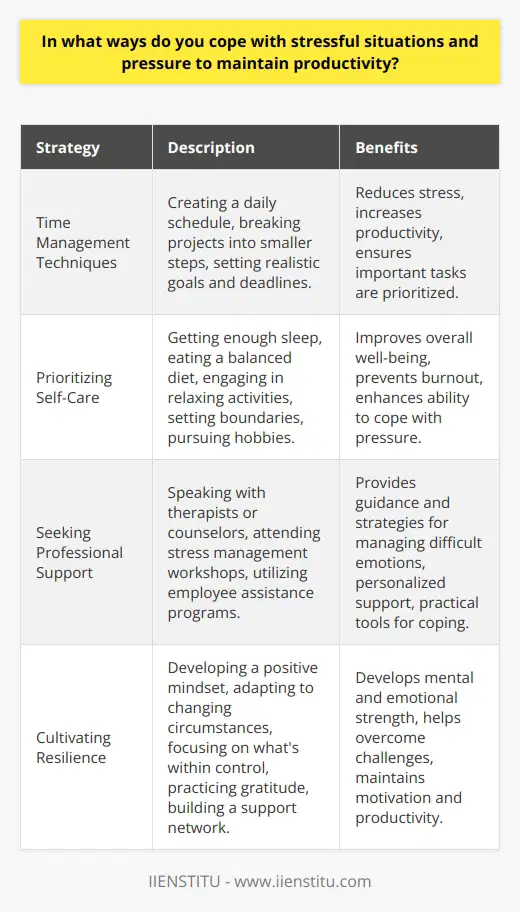
What is your strategy for dealing with stress peaks during high-pressure situations?
Dealing with stress peaks during high-pressure situations requires a well-planned strategy to maintain optimal performance and well-being. This paragraph will explore various techniques and approaches to effectively manage stress in demanding circumstances.
Identifying Stressors and Triggers
The first step in dealing with stress is to identify the specific stressors and triggers that lead to heightened stress levels. By recognizing these factors, individuals can develop targeted strategies to mitigate their impact and better prepare for high-pressure situations.
Developing a Proactive Mindset
Adopting a proactive mindset is crucial in managing stress during high-pressure situations. This involves anticipating potential challenges, planning ahead, and focusing on solutions rather than dwelling on problems. By taking control of one's thoughts and actions, individuals can reduce feelings of helplessness and increase their sense of empowerment.
Practicing Relaxation Techniques
Incorporating relaxation techniques into daily routines can help individuals build resilience and cope with stress more effectively. Deep breathing exercises, progressive muscle relaxation, and mindfulness meditation are proven methods for reducing stress and promoting a sense of calm.
Prioritizing Self-Care
Maintaining physical and mental well-being is essential for managing stress during high-pressure situations. Engaging in regular exercise, eating a balanced diet, and getting sufficient sleep can improve overall resilience and stress tolerance. Additionally, setting aside time for hobbies and enjoyable activities can provide a much-needed break from stress and help recharge energy levels.
Building a Support Network
Having a strong support network is invaluable when facing high-pressure situations. Surrounding oneself with supportive friends, family members, or colleagues can provide a sense of comfort and encouragement. Sharing concerns and seeking advice from trusted individuals can help gain new perspectives and reduce feelings of isolation.
Practicing Effective Time Management
Effective time management is a key strategy for reducing stress during high-pressure situations. By prioritizing tasks, setting realistic goals, and breaking large projects into smaller, manageable steps, individuals can avoid feeling overwhelmed and maintain a sense of control over their workload.
Cultivating a Growth Mindset
Adopting a growth mindset can help individuals view high-pressure situations as opportunities for personal and professional growth. By embracing challenges, learning from mistakes, and focusing on continuous improvement, individuals can reframe stress as a catalyst for development rather than a hindrance.
In conclusion, dealing with stress peaks during high-pressure situations requires a multifaceted approach that combines proactive planning, relaxation techniques, self-care, support systems, time management, and a growth mindset. By implementing these strategies, individuals can enhance their resilience, maintain optimal performance, and thrive in the face of adversity.
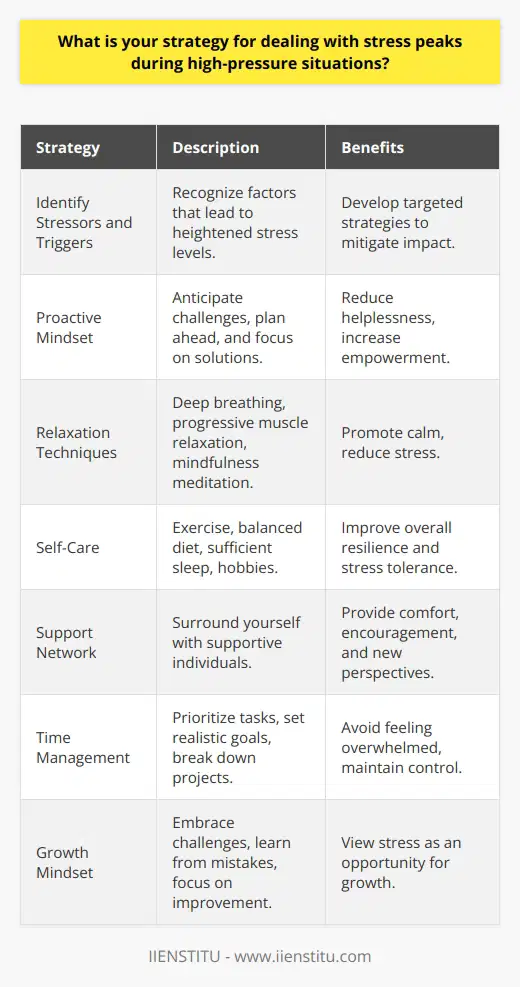
How do you prioritize tasks and manage your time effectively when facing stress peaks?
Prioritizing tasks and managing time effectively during stress peaks are essential skills for maintaining productivity and well-being. One effective approach is to use the Eisenhower Matrix, which categorizes tasks based on urgency and importance. This method helps identify critical tasks that require immediate attention and those that can be delegated or postponed. Another crucial aspect of time management is setting realistic goals and breaking them down into smaller, manageable steps. This approach prevents overwhelm and allows for a sense of progress and accomplishment.
Techniques for Prioritizing Tasks
Several techniques can help prioritize tasks during stressful periods. The ABC method involves assigning each task a letter grade based on its significance. "A" tasks are the most critical and should be tackled first, followed by "B" and "C" tasks. Another approach is the 80/20 rule, also known as the Pareto Principle. This principle suggests that 80% of results come from 20% of efforts. By identifying and focusing on the most impactful tasks, individuals can optimize their time and productivity.
Time Management Strategies
Effective time management strategies are crucial for navigating stress peaks. One such strategy is time blocking, which involves allocating specific time slots for different tasks or activities. This method helps maintain focus and reduces the likelihood of procrastination. Another useful technique is the Pomodoro Technique, which breaks work into 25-minute intervals, followed by short breaks. This approach enhances concentration and prevents burnout by allowing for regular rest periods.
Delegation and Seeking Support
During stress peaks, it is essential to recognize the importance of delegation and seeking support. Delegating tasks to others, when possible, can alleviate workload and allow for better focus on high-priority responsibilities. Additionally, seeking support from colleagues, mentors, or family members can provide valuable guidance and help manage stress levels. Open communication and collaboration can lead to more efficient problem-solving and task completion.
Self-Care and Stress Management
Prioritizing self-care and stress management is vital for maintaining productivity and well-being during stress peaks. Engaging in regular exercise, practicing mindfulness or meditation, and ensuring sufficient sleep are all essential components of a balanced lifestyle. Taking short breaks throughout the day to recharge and refocus can also help prevent burnout and maintain optimal performance. By prioritizing self-care, individuals can better manage stress and maintain the mental clarity necessary for effective task prioritization and time management.
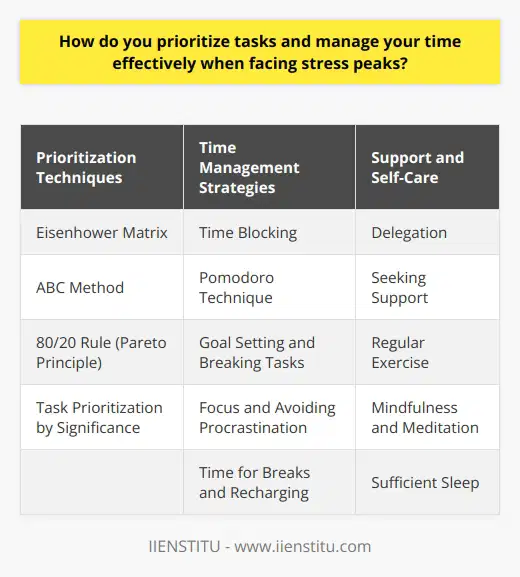
Can you describe a specific instance where you successfully handled a stress peak and what techniques you employed?
One specific instance where I successfully handled a stress peak was during my final year of university. I was juggling multiple deadlines for assignments, exams, and my thesis project. To manage this stress, I employed several techniques that helped me stay focused and productive.
Time Management and Prioritization
First, I created a detailed schedule that broke down my tasks into manageable chunks. I prioritized my assignments based on their deadlines and importance. This allowed me to tackle the most pressing tasks first and ensure that I was making steady progress on all fronts.
Breaking Tasks into Smaller Steps
I broke down larger projects, such as my thesis, into smaller, more achievable steps. This made the overall task feel less overwhelming and helped me maintain momentum. I set daily and weekly goals to keep myself accountable and motivated.
Self-Care and Stress-Reduction Techniques
I also made sure to prioritize self-care during this stressful period. I set aside time for regular exercise, which helped me clear my mind and reduce stress. I practiced mindfulness and deep breathing exercises to calm my nerves and improve my focus.
Maintaining a Healthy Work-Life Balance
Despite the heavy workload, I strived to maintain a healthy work-life balance. I scheduled breaks and made time for activities I enjoyed, such as spending time with friends and family. This helped me avoid burnout and maintain a positive outlook.
Seeking Support and Collaboration
I reached out to my professors, peers, and family members for support and guidance. Collaborating with classmates on group projects helped distribute the workload and provided a sense of camaraderie. Discussing my challenges with others helped me gain new perspectives and ideas.
Staying Organized and Focused
I kept my workspace clean and organized, which helped me stay focused and productive. I used tools like a planner and a to-do list to keep track of my tasks and deadlines. I also minimized distractions by finding quiet study spots and limiting my social media use.
Maintaining a Positive Mindset
Finally, I tried to maintain a positive mindset throughout this challenging period. I celebrated small victories and reminded myself of my progress. I reframed stress as a challenge to be overcome rather than a threat to my well-being.
By employing these techniques, I was able to successfully handle the stress peak of my final year. I completed all my assignments on time, performed well on my exams, and successfully defended my thesis. This experience taught me valuable lessons about stress management and resilience that I have carried with me into my professional life.
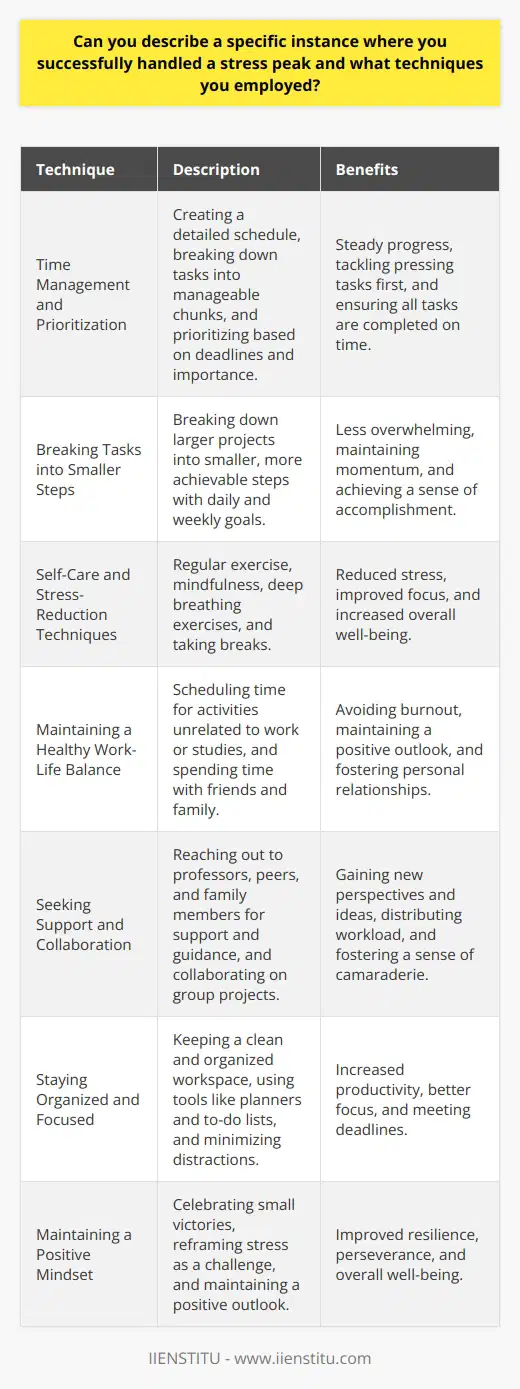
How do you typically handle stress and pressure in the workplace?
Handling stress and pressure in the workplace is a crucial skill for maintaining productivity and well-being. Everyone experiences stress differently, and finding effective coping strategies is essential. Here are some common methods for managing stress and pressure at work.
Prioritize and Organize Tasks
One of the most effective ways to reduce stress is to prioritize and organize your tasks. Make a to-do list and rank items based on urgency and importance. Break larger projects into smaller, manageable steps. This approach helps you focus on one task at a time, reducing feelings of being overwhelmed.
Practice Time Management
Effective time management is key to reducing stress in the workplace. Use tools like calendars and planners to schedule your day. Set realistic deadlines and allocate sufficient time for each task. Avoid procrastination by tackling challenging tasks first and minimizing distractions.
Take Regular Breaks
Taking regular breaks throughout the day can help alleviate stress and improve productivity. Step away from your desk for a few minutes to stretch, walk, or practice deep breathing exercises. Use your lunch break to disconnect from work and engage in relaxing activities.
Communicate Openly with Colleagues and Supervisors
Open communication is essential for managing stress in the workplace. Share your concerns and challenges with your colleagues and supervisors. Ask for help or clarification when needed. Collaborating with others can help distribute workload and provide support during stressful times.
Maintain a Healthy Work-Life Balance
Achieving a healthy work-life balance is crucial for reducing stress. Set clear boundaries between your work and personal life. Avoid checking work emails or taking work calls outside of office hours. Engage in hobbies and activities that bring you joy and help you relax.
Practice Mindfulness and Relaxation Techniques
Mindfulness and relaxation techniques can be powerful tools for managing stress. Practice deep breathing exercises, meditation, or yoga to calm your mind and body. Incorporate these techniques into your daily routine, even if only for a few minutes.
Seek Professional Help if Needed
If stress and pressure become overwhelming and affect your well-being, don't hesitate to seek professional help. Many workplaces offer employee assistance programs that provide counseling and support services. Talking to a therapist or counselor can help you develop personalized coping strategies.
Remember, everyone handles stress differently, and what works for one person may not work for another. Experiment with different stress management techniques to find what suits you best. By prioritizing self-care and implementing effective coping strategies, you can navigate the challenges of the workplace with greater ease and resilience.
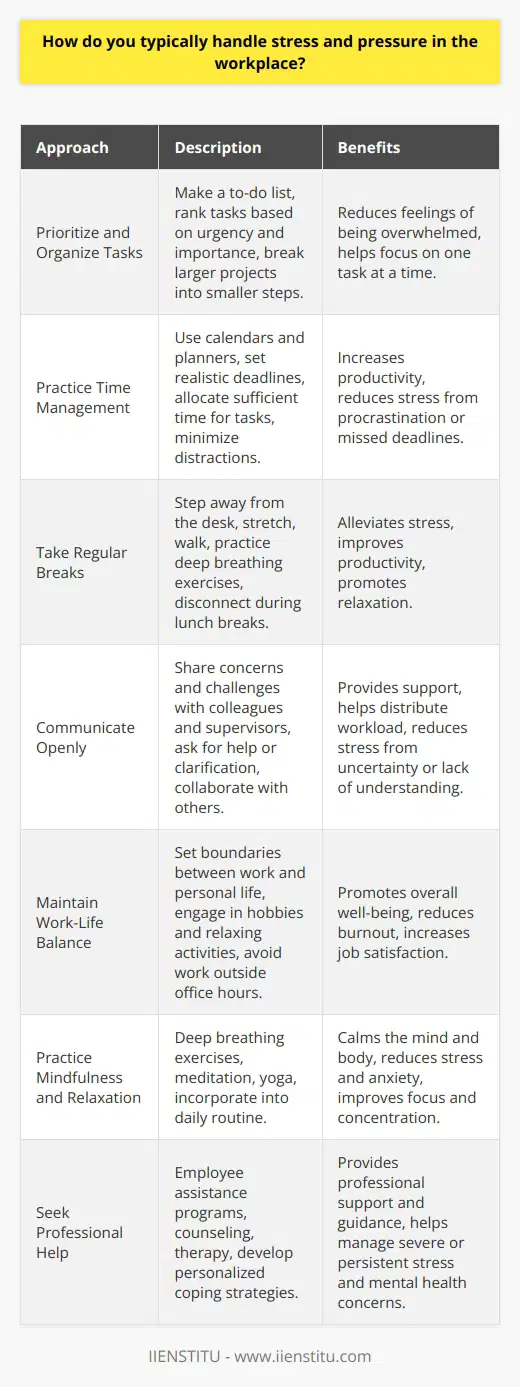
What strategies have you found effective in managing stress during challenging situations?
Effective stress management strategies during challenging situations involve a combination of mental, physical, and social approaches. One crucial technique is practicing mindfulness meditation, which helps individuals focus on the present moment and avoid getting overwhelmed by future uncertainties. Deep breathing exercises, such as diaphragmatic breathing, can also reduce stress by promoting relaxation and lowering heart rate. Additionally, engaging in regular physical activity, like jogging or yoga, releases endorphins and improves overall mood.
Cognitive Reframing and Time Management
Cognitive reframing is another powerful tool for managing stress in difficult times. This involves identifying and challenging negative thoughts, then replacing them with more balanced, positive perspectives. Effective time management skills, such as prioritizing tasks and breaking large projects into smaller, manageable steps, can help reduce stress by creating a sense of control and accomplishment. Setting realistic goals and boundaries, both personally and professionally, is also essential for maintaining a healthy work-life balance.
Social Support and Self-Care
Seeking social support from friends, family, or a professional therapist can provide a valuable outlet for expressing emotions and gaining new perspectives. Engaging in hobbies and leisure activities, such as reading, gardening, or playing music, can serve as a distraction from stressors and promote relaxation. Maintaining a healthy lifestyle through proper nutrition, hydration, and sufficient sleep is crucial for building resilience against stress.
Flexibility and Adaptability
Cultivating flexibility and adaptability is essential for coping with unexpected challenges. Embracing change and viewing obstacles as opportunities for growth can help reframe stressful situations in a more positive light. Practicing gratitude and focusing on the things one can control, rather than dwelling on what cannot be changed, can also foster a more resilient mindset.
Continuous Learning and Self-Reflection
Continuously learning and developing new coping strategies can enhance one's stress management toolkit. Attending workshops, reading self-help books, or learning relaxation techniques like progressive muscle relaxation can provide new insights and skills. Regular self-reflection through journaling or discussing experiences with a trusted confidant can help identify triggers and patterns, enabling individuals to make necessary adjustments to their stress management approach.
By incorporating a diverse range of strategies, including mindfulness, physical activity, cognitive reframing, social support, and self-care, individuals can effectively manage stress during challenging situations. Remembering to be patient, flexible, and kind to oneself is essential, as developing resilience is an ongoing process that requires practice and persistence.
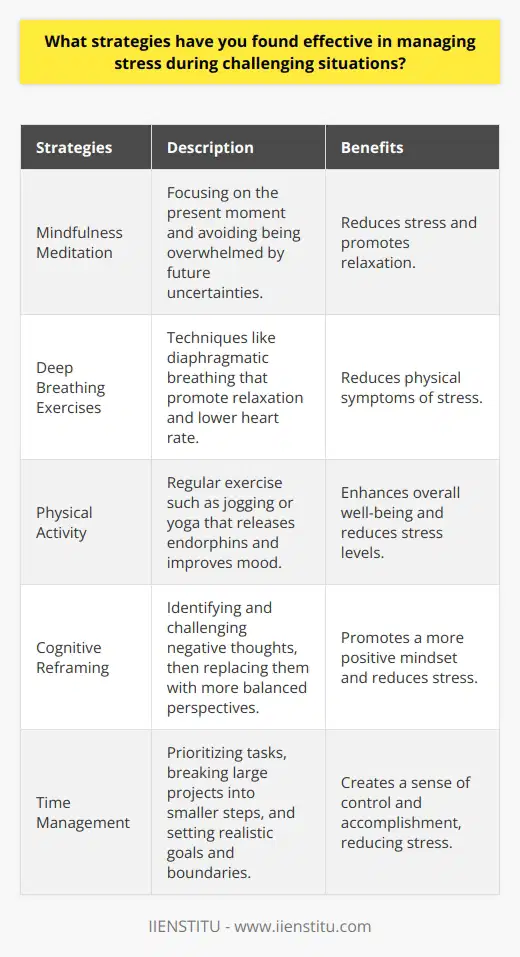
Can you describe a time when you successfully dealt with a high-pressure situation at work?
One memorable instance of successfully handling a high-pressure situation at work occurred during a critical project deadline. Our team was tasked with delivering a comprehensive software solution for a major client within an extremely tight timeframe. As the project manager, I knew that effective communication, delegation, and problem-solving would be key to our success.
Developing a Clear Plan of Action
To begin, I gathered the team to discuss the project requirements and develop a clear plan of action. We broke down the project into smaller, manageable tasks and assigned responsibilities based on each team member's strengths. By setting realistic goals and milestones, we created a roadmap to guide us through the challenging journey ahead.
Fostering Open Communication
Throughout the project, I emphasized the importance of open and transparent communication. We held daily stand-up meetings to discuss progress, identify potential roadblocks, and brainstorm solutions. By encouraging everyone to voice their concerns and ideas, we fostered a collaborative environment where problems could be addressed quickly and efficiently.
Adapting to Challenges
Despite our best efforts, unexpected challenges arose during the project. When a critical bug was discovered in the software, I immediately assembled a task force to investigate and resolve the issue. By remaining calm and focused, we were able to identify the root cause and implement a fix without derailing the entire project timeline.
Leveraging Resources and Expertise
To ensure we met the deadline, I actively sought out additional resources and expertise when needed. I collaborated with other departments to secure the necessary support and worked closely with senior developers to overcome technical hurdles. By leveraging the collective knowledge and skills of the organization, we were able to fill gaps and maintain our momentum.
Celebrating Success and Learning from Experience
Through the tireless efforts and dedication of the entire team, we successfully delivered the software solution to the client on time. We celebrated our achievement, recognizing the hard work and sacrifices made by everyone involved. However, I also took the time to reflect on the experience and identify areas for improvement.
Continuous Improvement
In the aftermath of the project, I conducted a thorough post-mortem analysis to evaluate our processes and performance. We discussed the lessons learned and identified opportunities for growth and development. By embracing a culture of continuous improvement, we aimed to enhance our ability to handle high-pressure situations in the future.
Key Takeaways
Successfully navigating a high-pressure situation at work requires a combination of effective leadership, clear communication, and adaptability. By developing a well-defined plan, fostering collaboration, and leveraging available resources, teams can overcome even the most challenging circumstances. It is equally important to celebrate successes and learn from experiences to continuously improve and grow as professionals.
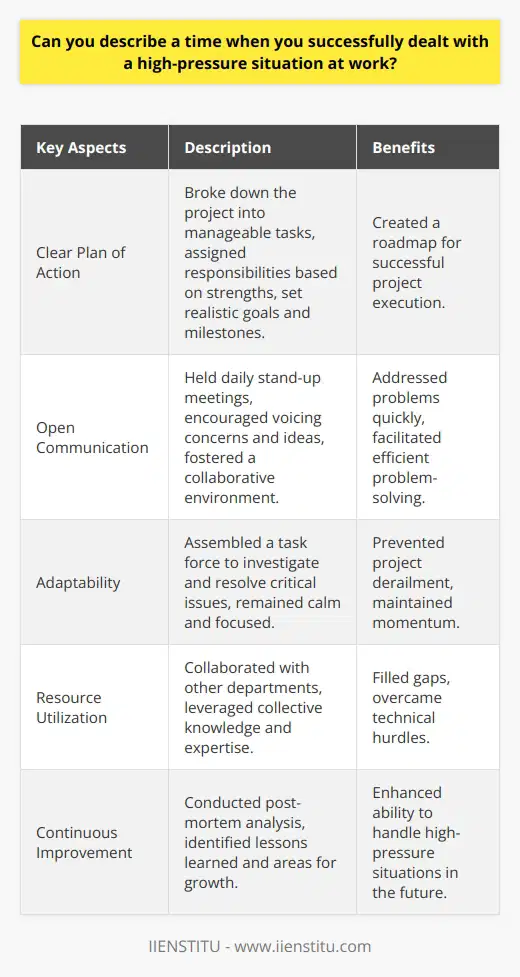
What strategies do you employ to manage stress during peak periods?
Stress management is a crucial skill to develop, especially during peak periods when demands on time and energy are high. Employing effective strategies to manage stress can help maintain productivity, mental well-being, and overall health. This paragraph explores various techniques that can be used to cope with stress during busy times.
Prioritizing Tasks and Time Management
One of the most important strategies for managing stress during peak periods is prioritizing tasks and managing time effectively. By identifying the most critical tasks and allocating time accordingly, individuals can ensure that they are focusing on the most important responsibilities. Breaking larger tasks into smaller, manageable steps can also help reduce feelings of overwhelm and make progress more attainable.
Creating a Schedule and Setting Boundaries
Creating a schedule and setting clear boundaries can also help manage stress during busy times. By blocking out specific times for work, rest, and leisure activities, individuals can maintain a sense of structure and balance. Setting boundaries, such as limiting work hours or saying no to non-essential commitments, can also help reduce stress and prevent burnout.
Practicing Mindfulness and Relaxation Techniques
Incorporating mindfulness and relaxation techniques into daily routines can be an effective way to manage stress during peak periods. Practices such as deep breathing, meditation, or yoga can help calm the mind and reduce physical tension. Taking short breaks throughout the day to engage in these activities can provide a much-needed respite from stressful situations and help maintain focus and productivity.
Engaging in Physical Activity and Self-Care
Engaging in regular physical activity and practicing self-care are also important strategies for managing stress. Exercise can help release endorphins, reduce tension, and improve overall mood. Self-care activities, such as getting enough sleep, eating a balanced diet, and engaging in hobbies or interests, can also help reduce stress and promote overall well-being.
Seeking Support and Delegating Tasks
Finally, seeking support from others and delegating tasks when possible can be effective strategies for managing stress during peak periods. Talking to friends, family, or colleagues about stressors can provide a sense of perspective and help identify potential solutions. Delegating tasks to others, when appropriate, can also help reduce workload and alleviate stress.
Conclusion
In conclusion, managing stress during peak periods requires a combination of strategies, including prioritizing tasks, setting boundaries, practicing mindfulness and relaxation techniques, engaging in physical activity and self-care, seeking support, and delegating tasks when possible. By employing these techniques, individuals can effectively cope with stress, maintain productivity, and promote overall well-being during busy times.

Can you provide examples of how you have successfully handled stress peaks in the past?
Stress peaks are an inevitable part of life, but successfully managing them is crucial for maintaining well-being and productivity. One effective strategy for handling stress is to prioritize tasks and focus on the most critical ones first. By breaking down larger tasks into smaller, manageable steps, individuals can avoid feeling overwhelmed and maintain a sense of control over their workload.
Time Management Techniques
Another key aspect of managing stress is effective time management. This involves setting realistic goals, creating a schedule, and allocating sufficient time for each task. By doing so, individuals can ensure that they have enough time to complete their work without feeling rushed or pressured. Additionally, taking regular breaks and engaging in relaxation techniques such as deep breathing or meditation can help reduce stress levels and improve overall well-being.
Seeking Support from Others
In times of high stress, it is also important to seek support from others. This can include talking to friends, family members, or colleagues about the challenges being faced and seeking their advice or assistance. Building a strong support network can provide a sense of connection and help individuals feel less alone in their struggles.
Maintaining a Healthy Lifestyle
Maintaining a healthy lifestyle is another critical component of managing stress. This includes getting enough sleep, eating a balanced diet, and engaging in regular exercise. Exercise, in particular, has been shown to reduce stress levels and improve mood by releasing endorphins, the body's natural mood-boosters.
Example of Successfully Handling Stress Peaks
One example of successfully handling stress peaks is a student who was studying for final exams. To manage the stress, the student created a study schedule, broke down larger tasks into smaller ones, and prioritized the most critical subjects. The student also made sure to take regular breaks, engage in relaxation techniques, and seek support from friends and family members. By implementing these strategies, the student was able to successfully manage the stress of final exams and achieve their academic goals.
In conclusion, successfully handling stress peaks requires a combination of effective strategies, including prioritization, time management, seeking support, and maintaining a healthy lifestyle. By implementing these techniques, individuals can reduce their stress levels, improve their overall well-being, and achieve their goals even in the face of challenging circumstances.

How do you prioritize tasks and maintain focus when facing high-stress situations?
Prioritizing tasks and maintaining focus in high-stress situations require a systematic approach and mental discipline. The first step is to assess the urgency and importance of each task. Urgent tasks demand immediate attention, while important tasks contribute to long-term goals. By categorizing tasks based on these criteria, you can create a prioritized to-do list.
Time Management Techniques
Effective time management is crucial in high-stress situations. The Pomodoro Technique is a popular method that involves working in focused 25-minute intervals, followed by short breaks. This technique helps maintain concentration and prevents burnout. Another approach is time-blocking, where you allocate specific time slots for each task on your calendar.
Minimizing Distractions
Distractions can significantly hinder productivity and focus. To minimize distractions, create a conducive work environment by finding a quiet space and reducing clutter. Turn off notifications on your devices and use website blockers to prevent access to time-wasting sites. Communicate your availability to colleagues and family members to minimize interruptions.
Effective Goal Setting
Setting clear and achievable goals is essential for staying motivated and focused. Break down large projects into smaller, manageable tasks. Set SMART (Specific, Measurable, Achievable, Relevant, and Time-bound) goals to provide structure and direction. Regularly review and adjust your goals to ensure they align with changing priorities.
Stress Management Techniques
High-stress situations can take a toll on mental and physical well-being. Incorporate stress management techniques into your daily routine. Practice deep breathing exercises or meditation to calm your mind and reduce anxiety. Engage in regular physical exercise to release endorphins and improve overall well-being. Make time for hobbies and activities that bring you joy and help you recharge.
Delegation and Collaboration
Delegating tasks to others can help alleviate stress and improve efficiency. Identify tasks that can be assigned to team members or colleagues with the necessary skills. Foster a collaborative environment where everyone contributes and supports each other. Effective communication is key to ensuring that tasks are completed accurately and on time.
Continuous Learning and Adaptability
In high-stress situations, it's important to remain adaptable and open to learning. Embrace challenges as opportunities for growth and development. Continuously update your skills and knowledge to stay competitive in your field. Seek feedback from others and be willing to make adjustments to your approach when necessary.
By implementing these strategies, you can effectively prioritize tasks, maintain focus, and manage stress in high-pressure environments. Remember to be kind to yourself and celebrate your achievements along the way. With practice and perseverance, you can develop the mental resilience needed to thrive in challenging situations.
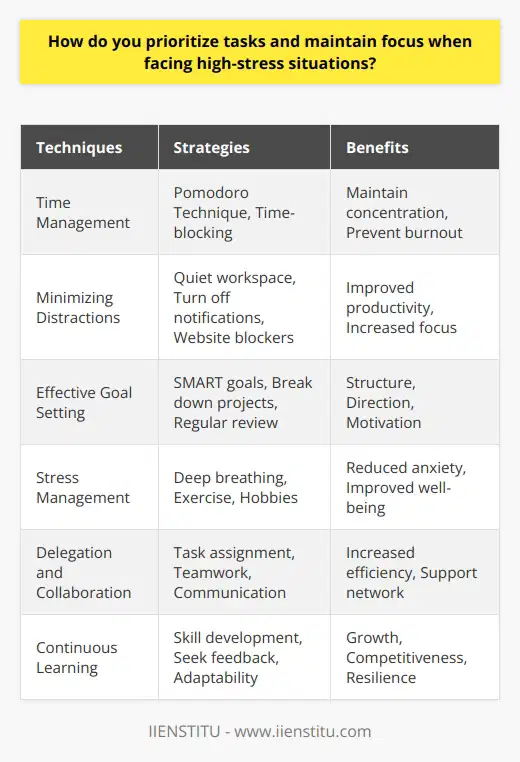
What are some common stress interview questions and how should I respond to them?
Stress interviews are designed to assess a candidate's ability to handle pressure and think on their feet. Interviewers may ask challenging or unexpected questions to observe how the candidate responds. Some common stress interview questions include:
1. "How would you handle a difficult client or colleague?"
When answering this question, demonstrate your problem-solving skills and ability to remain professional under pressure. Provide a specific example of a challenging situation you encountered and explain how you resolved it effectively. Emphasize your communication skills, empathy, and willingness to find a mutually beneficial solution.
2. "What would you do if you were given an impossible deadline?"
This question assesses your time management skills and ability to prioritize tasks. Explain that you would first evaluate the situation and break down the project into smaller, manageable tasks. Discuss how you would communicate with your team or supervisor to set realistic expectations and explore potential solutions, such as delegating tasks or seeking additional resources.
3. "How do you handle failure or criticism?"
Interviewers want to know if you can learn from your mistakes and maintain a positive attitude. When responding, acknowledge that failure and criticism are inevitable in any career. Share an example of a time when you faced failure or criticism and explain how you used it as an opportunity to learn and grow. Emphasize your resilience and ability to accept constructive feedback gracefully.
4. "What would you do if you discovered a colleague engaging in unethical behavior?"
This question evaluates your integrity and ability to handle sensitive situations. Explain that you would first gather all the relevant information and evidence. Then, discuss how you would approach the colleague directly to express your concerns and give them an opportunity to explain their actions. If the issue persists, state that you would escalate the matter to the appropriate authorities, such as a supervisor or HR department, following company protocol.
Tips for handling stress interviews:
Stay calm and composed, even if the questions become challenging or confrontational.
Take a moment to collect your thoughts before responding to difficult questions.
Provide specific examples to support your answers whenever possible.
Maintain a positive attitude and demonstrate your ability to handle pressure gracefully.
Be honest and authentic in your responses, as interviewers can often detect insincere answers.
Remember, the purpose of stress interviews is to evaluate your ability to think critically and perform under pressure. By remaining calm, providing thoughtful responses, and showcasing your problem-solving skills, you can demonstrate your resilience and adaptability to potential employers.
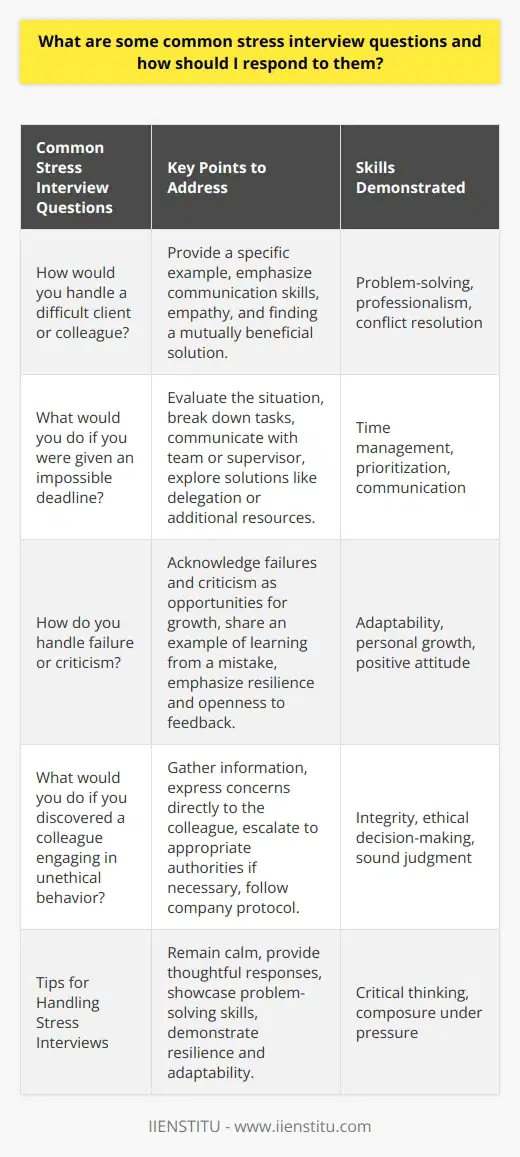
How can I prepare for a stress interview and maintain composure under pressure?
Preparing for a stress interview requires a combination of mental preparation, practice, and self-care techniques. First, research the company and the position to anticipate potential questions and scenarios. This will help you feel more confident and prepared during the interview. Practice answering common interview questions, such as "Tell me about yourself" and "What are your strengths and weaknesses?" with a friend or family member to get comfortable with the format.
Techniques for Maintaining Composure
During the interview, focus on maintaining a calm and composed demeanor. Take deep breaths and remind yourself that the interviewer's goal is to assess your ability to handle pressure, not to make you feel uncomfortable. If you find yourself getting flustered, take a moment to collect your thoughts before responding. It's okay to pause and think before answering a question.
Body Language and Communication
Pay attention to your body language and nonverbal communication. Sit up straight, make eye contact, and smile when appropriate. Speak clearly and confidently, even if you feel nervous. If you don't understand a question, ask for clarification rather than trying to guess what the interviewer wants to hear.
Staying Positive and Focused
Remember to stay positive throughout the interview, even if the questions become challenging. Focus on highlighting your strengths and accomplishments, and provide specific examples to support your answers. If you make a mistake or stumble over your words, don't dwell on it. Acknowledge it briefly and move on to the next question.
Self-Care and Stress Management
In the days leading up to the interview, prioritize self-care and stress management. Get plenty of sleep, eat well, and exercise regularly to help reduce stress and improve your overall well-being. Practice relaxation techniques, such as deep breathing or meditation, to help calm your nerves.
Visualization and Positive Self-Talk
Use visualization techniques to imagine yourself succeeding in the interview. Picture yourself answering questions confidently and making a great impression on the interviewer. Engage in positive self-talk, reminding yourself of your strengths and accomplishments. Believe in yourself and your ability to handle whatever challenges come your way.
Post-Interview Reflection
After the interview, take time to reflect on your performance. Identify areas where you excelled and areas where you could improve. Use this feedback to prepare for future interviews and continue developing your skills.
By following these strategies and techniques, you can effectively prepare for a stress interview and maintain composure under pressure. Remember, the key is to stay calm, focused, and confident in your abilities. With practice and preparation, you can successfully navigate even the most challenging interview situations.
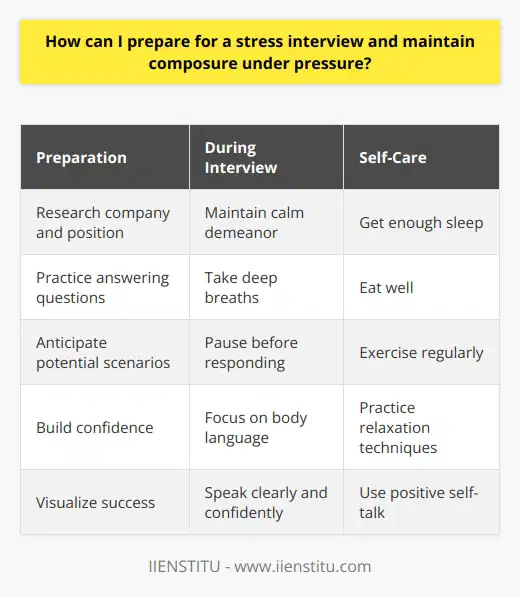
What are the most effective strategies for demonstrating problem-solving skills during a stress interview?
During a stress interview, demonstrating problem-solving skills is crucial to showcase your ability to handle challenging situations. One of the most effective strategies is to approach the problem systematically. Start by clearly identifying the issue at hand and breaking it down into smaller, manageable components. This structured approach allows you to tackle the problem step by step, making it less overwhelming and more accessible.
Gather Relevant Information
To solve a problem effectively, it's essential to gather all relevant information. Ask clarifying questions to ensure you fully understand the problem. Seek out additional data or resources that can help you make informed decisions. By actively collecting information, you demonstrate your proactive approach and dedication to finding the best solution.
Analyze the Problem
Once you have gathered the necessary information, analyze the problem from different angles. Consider the potential causes and consequences of the issue. Look for patterns or connections that may provide insights into the problem. By thoroughly analyzing the situation, you showcase your critical thinking abilities and attention to detail.
Generate Multiple Solutions
Instead of focusing on a single solution, generate several possible options. Brainstorm ideas, even if they seem unconventional at first. Encourage creative thinking and consider alternative perspectives. By presenting multiple solutions, you demonstrate your ability to think outside the box and adapt to different scenarios.
Evaluate and Select the Best Solution
After generating potential solutions, evaluate each one based on its feasibility, effectiveness, and potential consequences. Consider the resources required, the timeline, and any potential risks or obstacles. Weigh the pros and cons of each option and select the solution that offers the best balance of practicality and effectiveness.
Communicate Your Thought Process
During the stress interview, it's essential to communicate your thought process clearly. Explain how you approached the problem, the steps you took, and the reasoning behind your decisions. Use specific examples to illustrate your problem-solving skills in action. By articulating your thought process, you demonstrate your ability to think logically and convey complex ideas effectively.
Remain Calm and Confident
Throughout the stress interview, maintain a calm and confident demeanor. Take a deep breath and stay focused on the task at hand. Avoid getting flustered or defensive when faced with challenging questions or scenarios. Embrace the opportunity to showcase your problem-solving abilities and remain poised under pressure.
Remember, the key to demonstrating problem-solving skills during a stress interview is to approach the situation systematically, gather relevant information, analyze the problem from different angles, generate multiple solutions, evaluate and select the best option, communicate your thought process clearly, and maintain a calm and confident demeanor. By employing these strategies, you can effectively showcase your ability to handle complex problems and thrive in challenging situations.
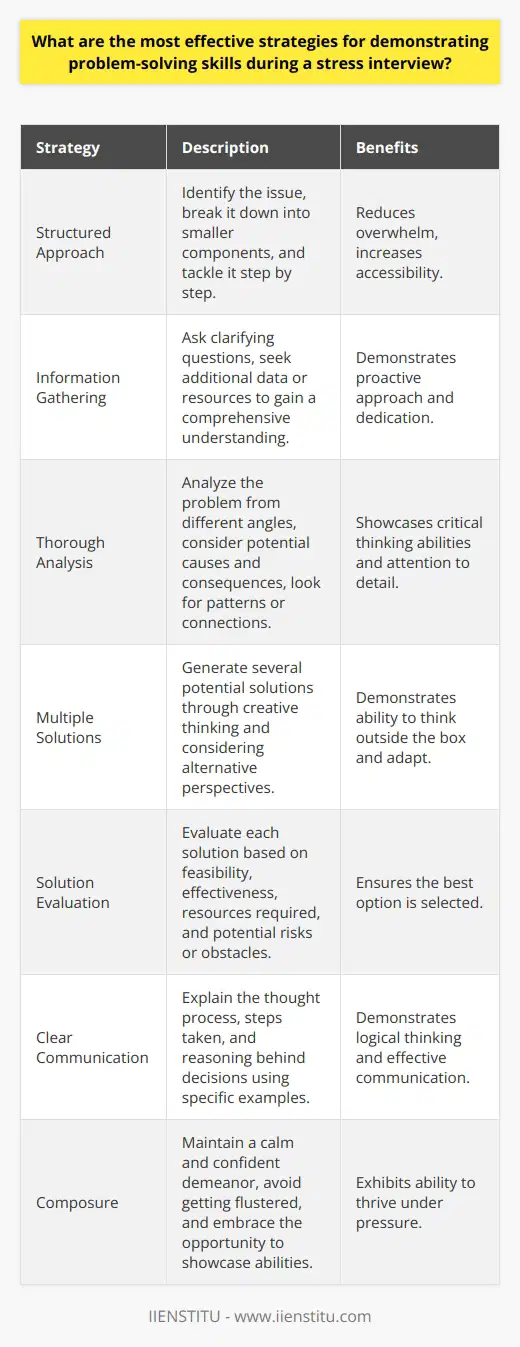
How do you manage stress and pressure in your professional life?
Managing stress and pressure in professional life is crucial for maintaining well-being and optimizing performance. Implementing effective strategies can help individuals cope with demanding situations and prevent burnout. One fundamental approach is to prioritize tasks and set realistic goals, ensuring that workload remains manageable. Breaking down complex projects into smaller, achievable steps can make them less overwhelming and more approachable.
Time Management and Organization
Effective time management is essential for reducing stress and pressure in the workplace. Utilizing tools such as calendars, to-do lists, and project management software can help streamline tasks and deadlines. Allocating specific time slots for focused work, breaks, and leisure activities promotes a healthy work-life balance. Learning to delegate tasks and collaborate with colleagues can also alleviate individual workload and foster a supportive work environment.
Stress-Reduction Techniques
Incorporating stress-reduction techniques into daily routines can significantly improve stress management. Regular exercise, such as yoga or cardio workouts, releases endorphins and reduces tension. Practicing mindfulness, deep breathing exercises, or meditation can calm the mind and promote relaxation. Engaging in hobbies or activities that bring joy and fulfillment outside of work helps maintain a positive outlook and reduces overall stress levels.
Communication and Support
Open communication with colleagues, supervisors, and mentors is crucial for managing stress in professional life. Discussing concerns, seeking guidance, and expressing needs can lead to practical solutions and emotional support. Building a strong network of supportive relationships within and outside the workplace provides a foundation for navigating challenging situations. Participating in stress management workshops or seeking professional counseling can also offer valuable tools and insights for coping with pressure.
Self-Care and Boundaries
Prioritizing self-care is essential for managing stress and preventing burnout. Setting clear boundaries between work and personal life, such as disconnecting from work-related communication outside of designated hours, allows for necessary rest and rejuvenation. Engaging in regular self-care practices, such as getting sufficient sleep, maintaining a balanced diet, and pursuing enjoyable activities, promotes overall well-being and resilience in the face of professional challenges.
By implementing a combination of these strategies, professionals can effectively manage stress and pressure in their careers. Recognizing the importance of self-awareness, proactive planning, and seeking support when needed empowers individuals to thrive in demanding work environments. Cultivating a balanced and resilient approach to professional life not only enhances personal well-being but also contributes to improved job satisfaction and long-term success.
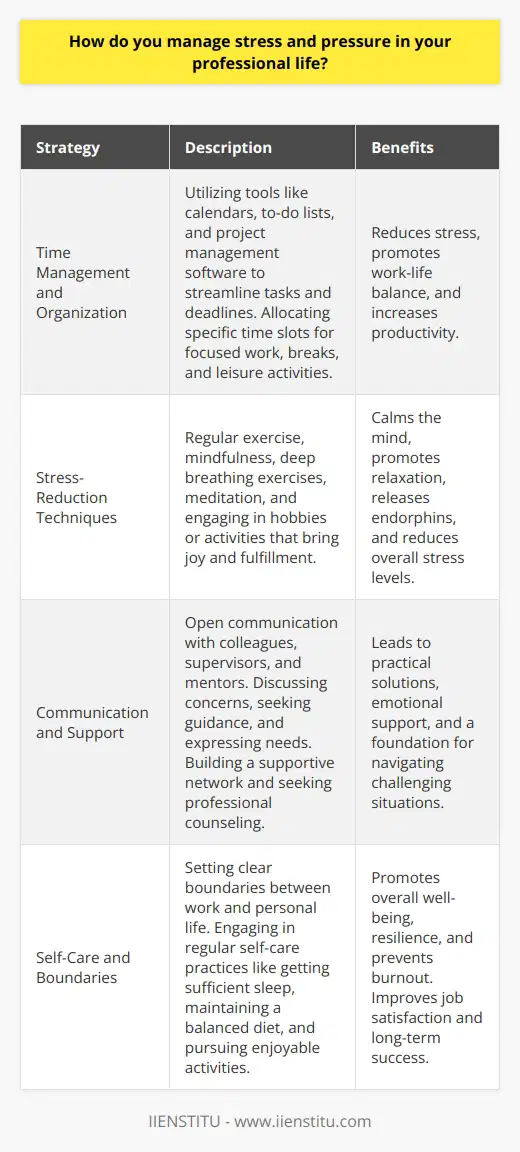
What strategies do you employ to cope with stressful situations at work?
Coping with stressful situations at work requires a multifaceted approach involving both personal and professional strategies. One effective method is to prioritize tasks and manage time efficiently. This involves creating a to-do list, setting realistic goals, and allocating sufficient time for each task. By doing so, individuals can reduce the feeling of being overwhelmed and maintain a sense of control over their workload.
Effective Communication
Another crucial strategy is to maintain open and effective communication with colleagues and supervisors. This includes seeking clarification when necessary, expressing concerns, and asking for help when needed. By fostering a supportive and collaborative work environment, individuals can mitigate stress and find solutions to challenging situations.
Practicing Mindfulness
Incorporating mindfulness techniques into daily work routines can also help manage stress. This may involve taking short breaks to practice deep breathing exercises or engaging in brief meditation sessions. These practices can help individuals remain present, focused, and calm, even in the face of high-pressure situations.
Maintaining Work-Life Balance
Establishing and maintaining a healthy work-life balance is essential for reducing stress. This involves setting clear boundaries between work and personal life, such as avoiding work-related tasks during off-hours and engaging in hobbies or activities that promote relaxation and well-being. By prioritizing self-care and making time for enjoyable pursuits, individuals can recharge and approach work-related challenges with renewed energy and resilience.
Seeking Support
When faced with particularly stressful situations, it is important to seek support from others. This may involve reaching out to trusted colleagues, friends, or family members for advice, guidance, or simply a listening ear. Additionally, many organizations offer employee assistance programs that provide confidential counseling and resources to help individuals cope with work-related stress.
Continuous Learning and Adaptability
Finally, embracing a mindset of continuous learning and adaptability can help individuals navigate stressful situations more effectively. This involves staying up-to-date with industry trends, acquiring new skills, and being open to change. By viewing challenges as opportunities for growth and development, individuals can maintain a positive outlook and build resilience in the face of adversity.
In conclusion, coping with stressful situations at work requires a proactive and holistic approach. By prioritizing tasks, communicating effectively, practicing mindfulness, maintaining work-life balance, seeking support, and embracing continuous learning, individuals can successfully manage stress and thrive in their professional lives.
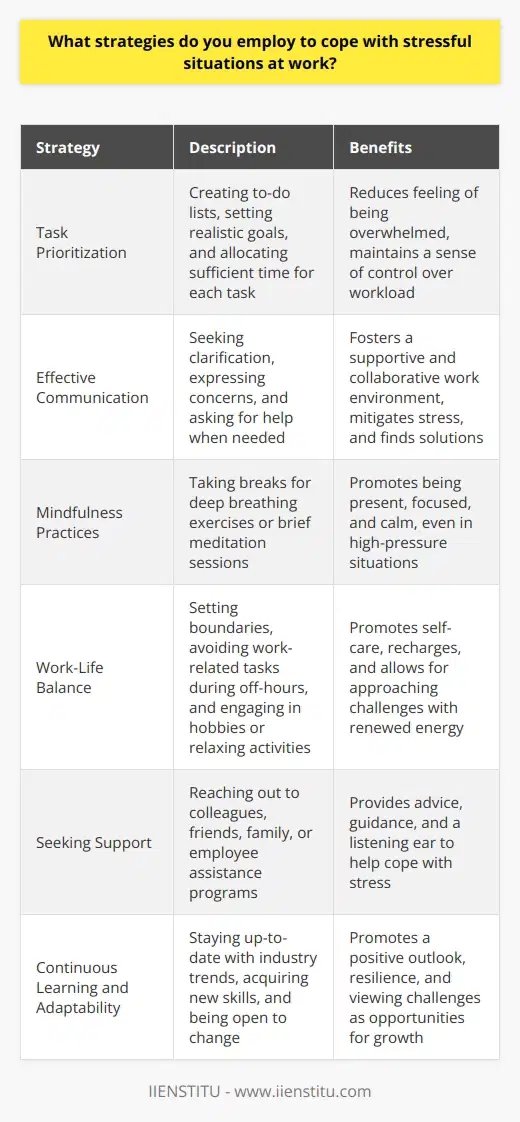
In what ways do you maintain your composure and productivity when faced with job-related stress and pressure?
Maintaining composure and productivity in the face of job-related stress and pressure is crucial for professional success. Developing effective strategies to manage stress can help individuals remain focused, efficient, and mentally balanced in challenging work environments. This article explores various ways to maintain composure and productivity when faced with job-related stress and pressure.
Prioritizing Tasks and Time Management
One of the most effective ways to maintain composure and productivity is through proper prioritization and time management. By identifying and focusing on the most critical tasks, individuals can ensure that their efforts are directed towards high-impact activities. Breaking down larger projects into smaller, manageable tasks can help reduce overwhelming feelings and increase a sense of control.
Effective time management techniques, such as the Pomodoro Technique or time-blocking, can help individuals stay focused and avoid distractions. These methods involve dedicating specific time intervals to focused work, followed by short breaks to recharge and maintain mental clarity. By managing time efficiently, individuals can reduce stress and increase productivity.
Practicing Mindfulness and Stress-Reduction Techniques
Mindfulness and stress-reduction techniques are powerful tools for maintaining composure in high-pressure situations. Practicing mindfulness involves being present in the moment, observing thoughts and emotions without judgment, and cultivating a sense of calm. Techniques such as deep breathing exercises, meditation, or yoga can help individuals center themselves and reduce stress levels.
Engaging in regular physical exercise is another effective way to manage stress and maintain mental well-being. Exercise releases endorphins, reduces tension, and improves overall mood. Taking short breaks throughout the day to stretch, walk, or engage in light physical activity can help refresh the mind and boost productivity.
Establishing Boundaries and Seeking Support
Setting clear boundaries between work and personal life is essential for maintaining composure and preventing burnout. Establishing specific work hours, disconnecting from work-related tasks during off-hours, and creating a dedicated workspace can help individuals maintain a healthy work-life balance. It is important to prioritize self-care activities, such as spending time with loved ones, pursuing hobbies, or engaging in relaxation techniques.
Seeking support from colleagues, supervisors, or mentors can also help alleviate job-related stress. Building strong professional relationships and fostering open communication can create a supportive work environment. Collaborating with team members, delegating tasks when appropriate, and seeking guidance or feedback can help individuals navigate challenging situations and maintain composure.
Developing Resilience and Adaptability
Cultivating resilience and adaptability is crucial for maintaining composure and productivity in the face of job-related stress. Resilience involves the ability to bounce back from setbacks, learn from failures, and maintain a positive outlook. Embracing challenges as opportunities for growth and learning can help individuals develop a resilient mindset.
Adaptability is the capacity to adjust to changing circumstances and find alternative solutions when faced with obstacles. Being open to new ideas, embracing change, and developing a flexible approach to problem-solving can help individuals navigate stressful situations more effectively. Continuously learning and acquiring new skills can also enhance adaptability and boost confidence in handling job-related pressures.
Conclusion
Maintaining composure and productivity in the face of job-related stress and pressure requires a proactive and holistic approach. By prioritizing tasks, practicing mindfulness, setting boundaries, seeking support, and developing resilience and adaptability, individuals can effectively manage stress and excel in their professional lives. Embracing these strategies can lead to improved mental well-being, enhanced job satisfaction, and long-term career success.
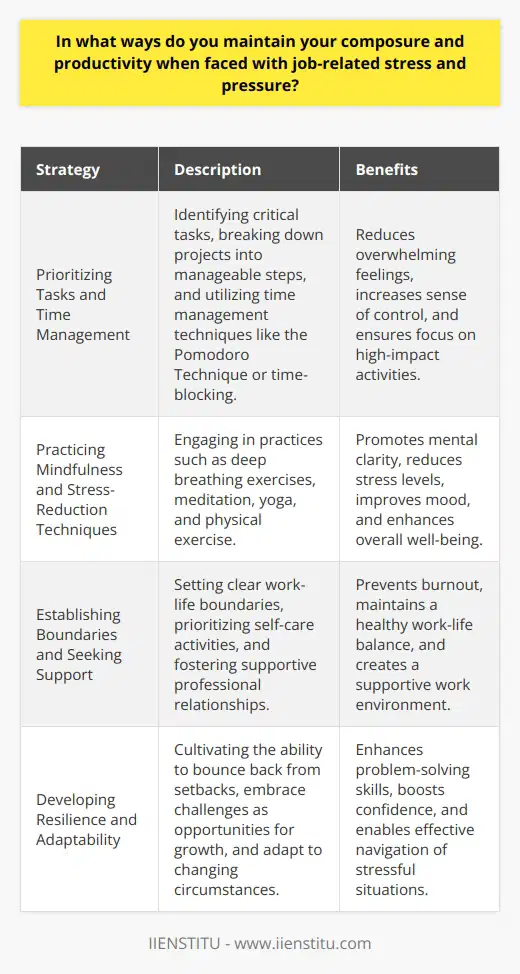
How do you handle stressful situations at work?
Handling stressful situations at work is a crucial skill for maintaining productivity and well-being in the workplace. Several strategies can be employed to effectively manage stress and navigate challenging circumstances. One key approach is to prioritize tasks and focus on the most critical and time-sensitive responsibilities. By breaking down larger projects into smaller, manageable steps, individuals can avoid feeling overwhelmed and maintain a sense of control over their workload.
Effective Communication and Support
Another essential aspect of managing stress at work is engaging in open and honest communication with colleagues and supervisors. Seeking support and guidance when needed can help alleviate the burden of stress and provide valuable insights and solutions. Additionally, maintaining a positive attitude and practicing mindfulness techniques, such as deep breathing and meditation, can help individuals remain calm and focused during high-pressure situations.
Setting Boundaries and Self-Care
It is also important to establish clear boundaries between work and personal life to prevent work-related stress from spilling over into other areas. Taking regular breaks throughout the day, engaging in physical activity, and prioritizing self-care activities can help reduce stress levels and promote overall well-being. Furthermore, learning to say "no" when necessary and avoiding overcommitting to tasks can help individuals maintain a healthy work-life balance.
Seeking Professional Help
In cases where stress becomes overwhelming or persistent, it may be beneficial to seek professional help. Many workplaces offer employee assistance programs (EAPs) that provide confidential counseling and support services to help individuals cope with work-related stress and other personal challenges. Utilizing these resources can be an effective way to address stress and develop long-term coping strategies.
Continuous Learning and Adaptation
Finally, it is essential to recognize that handling stressful situations at work is an ongoing process that requires continuous learning and adaptation. By staying open to new strategies, seeking feedback from others, and regularly evaluating one's stress management techniques, individuals can continue to improve their ability to navigate challenging circumstances and maintain a healthy and productive work environment.

What are some effective strategies for managing stress in high-pressure environments?
Managing stress in high-pressure environments is crucial for maintaining mental health and optimal performance. Several effective strategies can help individuals cope with stress in these situations.
Prioritizing Self-Care
One of the most important strategies for managing stress is prioritizing self-care. This includes getting enough sleep, eating a balanced diet, and engaging in regular physical activity. When you take care of your physical health, you are better equipped to handle stress.
Additionally, taking breaks throughout the day can help reduce stress levels. Step away from your work for a few minutes, take deep breaths, or engage in a relaxing activity.
Developing a Support System
Having a strong support system is essential for managing stress in high-pressure environments. Surround yourself with positive, supportive people who understand your challenges. Talk to friends, family, or colleagues about your stress, and seek their advice and encouragement.
Consider joining a support group or seeking professional help if stress becomes overwhelming. A therapist or counselor can provide valuable tools and strategies for coping with stress.
Practicing Mindfulness
Mindfulness is the practice of being present in the moment and observing your thoughts and feelings without judgment. It can be an effective tool for managing stress in high-pressure situations.
Take a few minutes each day to practice mindfulness techniques, such as deep breathing, meditation, or yoga. These practices can help calm your mind, reduce stress, and improve focus.
Setting Realistic Goals
Setting realistic goals can help manage stress in high-pressure environments. Break large projects into smaller, manageable tasks, and prioritize them based on importance and urgency.
Celebrate your accomplishments along the way, and don't be too hard on yourself if you don't meet every goal. Remember that progress, not perfection, is the key to success.
Maintaining Work-Life Balance
Maintaining a healthy work-life balance is crucial for managing stress in high-pressure environments. Set boundaries between your work and personal life, and make time for activities you enjoy outside of work.
Disconnect from work when you're not on the clock, and avoid checking emails or taking work calls during your free time. Engage in hobbies, spend time with loved ones, and prioritize rest and relaxation.
Practicing Effective Communication
Effective communication can help reduce stress in high-pressure environments. Be clear and direct in your communication with colleagues, supervisors, and clients. Ask for help when you need it, and don't be afraid to say no when necessary.
When conflicts arise, approach them with a solution-focused mindset. Listen actively, express your concerns respectfully, and work together to find a mutually beneficial resolution.
By implementing these strategies, individuals can effectively manage stress in high-pressure environments. Remember that stress management is an ongoing process, and it may take time to find the techniques that work best for you. With practice and persistence, you can develop resilience and thrive in even the most challenging situations.

How can one maintain a positive outlook during stressful times?
Maintaining a positive outlook during stressful times is crucial for overall well-being and mental health. One effective way to achieve this is by focusing on the present moment and practicing mindfulness. Engaging in mindfulness techniques, such as deep breathing and meditation, can help reduce anxiety and promote a sense of calm. Additionally, regular exercise has been shown to release endorphins, which are natural mood-boosters that can help alleviate stress and improve overall mood.
The Power of Positive Self-Talk
Another key strategy for maintaining a positive outlook is to engage in positive self-talk. This involves consciously replacing negative thoughts with more optimistic and constructive ones. By challenging negative self-talk and reframing thoughts in a more positive light, individuals can improve their overall mindset and reduce stress levels. It is also important to surround oneself with supportive and positive individuals who can provide encouragement and help maintain a positive perspective.
Cultivating Gratitude and Resilience
Cultivating gratitude is another powerful tool for maintaining a positive outlook during challenging times. Taking time each day to reflect on the things one is thankful for can help shift focus away from stressors and promote a more optimistic mindset. Keeping a gratitude journal or sharing appreciations with others can further reinforce feelings of positivity and contentment.
Building resilience is also essential for maintaining a positive outlook in the face of adversity. Resilience refers to the ability to bounce back from setbacks and adapt to changing circumstances. Developing a growth mindset, which views challenges as opportunities for learning and personal growth, can help foster resilience. Engaging in activities that promote self-care, such as hobbies, social connections, and adequate sleep, can also contribute to building resilience and maintaining a positive outlook.
Seeking Support and Maintaining Perspective
The Importance of Social Connections
During stressful times, it is important to seek support from others. Connecting with friends, family, or a therapist can provide a safe space to express feelings and receive guidance and encouragement. Social support has been shown to buffer the negative effects of stress and promote overall well-being.
Maintaining a Balanced Perspective
Finally, maintaining a balanced perspective is crucial for preserving a positive outlook during stressful periods. It is important to remember that stressful situations are often temporary and that there are always opportunities for growth and learning. Focusing on the bigger picture and keeping long-term goals in mind can help put current challenges into perspective and provide motivation to persevere.
Conclusion
In summary, maintaining a positive outlook during stressful times requires a combination of mindfulness, positive self-talk, gratitude, resilience, social support, and perspective. By incorporating these strategies into daily life, individuals can effectively manage stress, improve overall well-being, and maintain a positive mindset in the face of challenges.
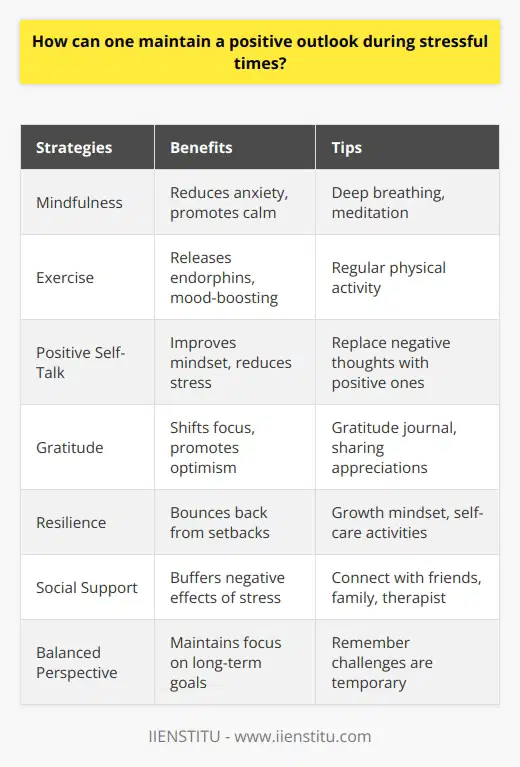
How do you typically handle stress and pressure in a work environment?
Handling stress and pressure in a work environment is crucial for maintaining productivity and well-being. Effective strategies include prioritizing tasks, communicating openly with colleagues and supervisors, and practicing self-care. By implementing these techniques, individuals can better manage their workload and maintain a positive attitude.
Prioritize Tasks and Manage Time Effectively
One of the most important ways to handle stress and pressure at work is to prioritize tasks. Identify urgent and important responsibilities and tackle them first. Use time management techniques like the Pomodoro Technique to stay focused and avoid procrastination. Breaking large projects into smaller, manageable steps can also help reduce stress and increase productivity.
Communicate Openly and Seek Support
Open communication with colleagues and supervisors is essential for managing stress in the workplace. Don't hesitate to ask for help or clarification when needed. Collaborating with team members can lighten the workload and provide a support system. Regular check-ins with supervisors can help identify potential stressors and find solutions.
Practice Self-Care and Stress-Reduction Techniques
Taking care of yourself is crucial for managing stress and pressure at work. Engage in activities that promote relaxation and stress relief, such as deep breathing exercises or meditation. Regular exercise, a balanced diet, and sufficient sleep can also improve overall well-being and resilience to stress. Set boundaries between work and personal life to avoid burnout.
Maintain a Positive Attitude and Perspective
Adopting a positive outlook can significantly impact how you handle stress and pressure at work. Reframe challenges as opportunities for growth and learning. Celebrate successes, no matter how small, and learn from setbacks. Cultivate a growth mindset and focus on continuous improvement. Surround yourself with supportive colleagues who foster a positive work environment.
Seek Professional Help When Needed
If stress and pressure become overwhelming and affect your well-being or performance, don't hesitate to seek professional help. Many organizations offer employee assistance programs that provide counseling and support services. Talking to a therapist or counselor can help develop personalized coping strategies and address underlying issues contributing to stress.
Conclusion
Handling stress and pressure in a work environment requires a proactive and multi-faceted approach. By prioritizing tasks, communicating openly, practicing self-care, maintaining a positive attitude, and seeking support when needed, individuals can effectively manage stress and thrive in their professional roles. Remember, everyone experiences stress differently, so it's essential to find strategies that work best for you and your unique situation.

What strategies have you found effective in managing stress and pressure as a fresher?
As a fresher, managing stress and pressure can be challenging, but several strategies can help you cope effectively. One of the most important approaches is to prioritize self-care, which includes maintaining a balanced diet, getting enough sleep, and engaging in regular physical exercise. These habits contribute to overall well-being and increase resilience to stress.
Time Management Techniques
Developing good time management skills is crucial for reducing stress and pressure. Break down larger tasks into smaller, manageable steps and create a schedule to allocate time for each activity. Use tools like calendars, to-do lists, and productivity apps to stay organized and on track. Remember to set realistic goals and deadlines, and avoid procrastination by tackling important tasks first.
Mindfulness and Relaxation
Practicing mindfulness and relaxation techniques can help alleviate stress and promote mental well-being. Engage in activities such as meditation, deep breathing exercises, or yoga to calm your mind and body. These practices can help you stay focused, reduce anxiety, and improve overall mood. Incorporating short breaks throughout the day to unwind and recharge is also beneficial.
Support Systems
Building a strong support system is essential for managing stress and pressure. Surround yourself with positive and supportive people, such as friends, family, or mentors, who can offer guidance and encouragement. Don't hesitate to reach out for help when needed, whether it's for academic assistance, emotional support, or advice on navigating new challenges.
Effective Communication
Open and effective communication is key to managing stress in both personal and professional settings. Express your thoughts, concerns, and needs clearly and assertively. If you're feeling overwhelmed, discuss your workload with supervisors or colleagues and explore ways to distribute tasks more efficiently. Maintaining healthy boundaries and learning to say "no" when necessary can also help prevent burnout.
Continuous Learning and Adaptability
Embrace a growth mindset and view challenges as opportunities for learning and personal development. Stay curious, seek out new knowledge, and be open to feedback and constructive criticism. Adapt to changes and setbacks by remaining flexible and focusing on solutions rather than dwelling on problems. Celebrate your achievements, no matter how small, and learn from your mistakes.
Balancing Work and Life
Maintaining a healthy work-life balance is crucial for managing stress and pressure. Set aside time for hobbies, recreational activities, and socializing with friends and family. Engage in pursuits that bring you joy and help you relax, such as reading, listening to music, or exploring creative outlets. Remember that taking breaks and allowing yourself to recharge is essential for long-term success and well-being.
By implementing these strategies consistently and being patient with yourself, you can effectively manage stress and pressure as a fresher. Remember that everyone experiences stress differently, so it's important to find the techniques that work best for you. Don't hesitate to seek professional help, such as counseling or therapy, if you find yourself struggling to cope with stress and pressure on your own.
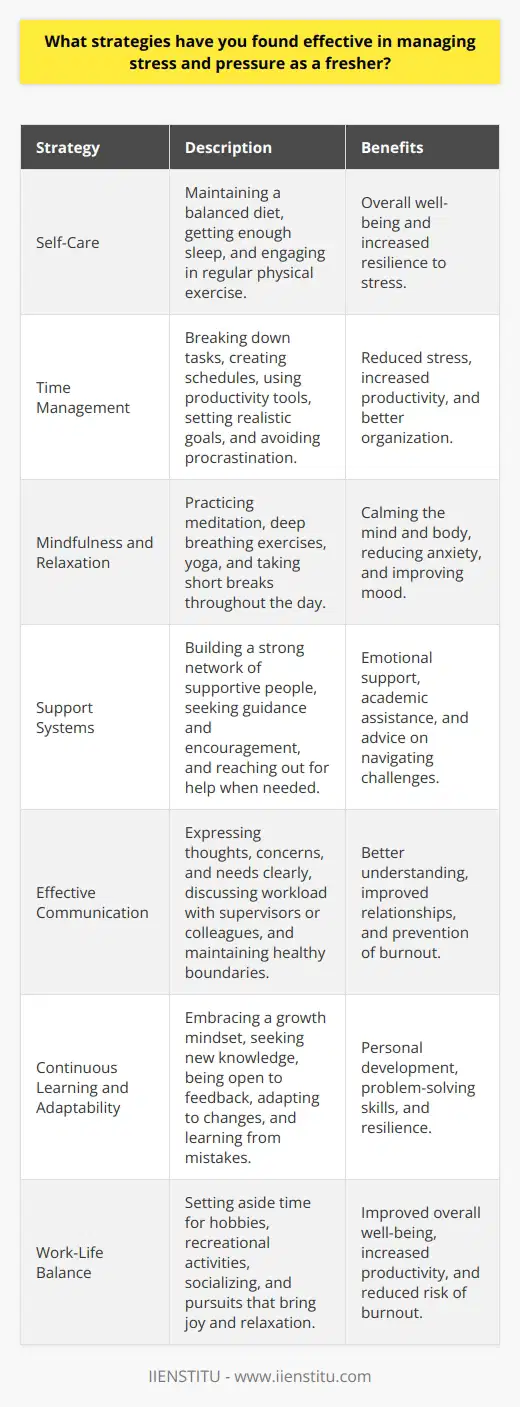
Can you describe a time when you successfully dealt with a stressful situation as a new employee?
As a new employee, I once encountered a stressful situation that required quick thinking and adaptability. On my second day at work, I was assigned a critical project with a tight deadline. The project involved coordinating with multiple departments and compiling a comprehensive report. Initially, I felt overwhelmed by the magnitude of the task and the limited time available.
Assessing the Situation
To tackle the stressful situation, I first took a step back and assessed the project requirements. I broke down the project into smaller, manageable tasks and created a timeline for each component. This helped me prioritize my work and focus on the most critical aspects of the project.
Effective Communication
I realized that effective communication was key to successfully completing the project. I reached out to my colleagues in different departments and scheduled brief meetings to discuss their contributions. By maintaining open lines of communication, I ensured that everyone was on the same page and working towards a common goal.
Time Management
To meet the tight deadline, I had to manage my time efficiently. I prioritized tasks based on their urgency and importance. I also made sure to allocate sufficient time for reviewing and refining the report before submission. By staying organized and focused, I was able to complete the project within the given timeframe.
Seeking Guidance
As a new employee, I recognized the importance of seeking guidance when needed. I approached my supervisor and expressed my concerns about the project's complexity. My supervisor provided valuable insights and resources that helped me navigate the challenges more effectively. This experience taught me the value of asking for help when faced with a stressful situation.
Lessons Learned
Dealing with this stressful situation as a new employee taught me several valuable lessons. I learned the importance of breaking down complex tasks, communicating effectively, managing time efficiently, and seeking guidance when necessary. These skills have proven to be invaluable in my professional growth and have helped me tackle subsequent challenges with greater confidence.
Conclusion
Successfully handling a stressful situation as a new employee requires a combination of strategic planning, effective communication, time management, and a willingness to seek help. By applying these principles, I was able to overcome the challenges posed by the critical project and deliver a comprehensive report within the tight deadline. This experience has strengthened my ability to adapt to high-pressure situations and has prepared me for future challenges in my career.
